#and the narrative tells that story in every single detail
Explore tagged Tumblr posts
Text
kyle who very early on realizes that you can't fall asleep to silence, putting the pieces together that first time you walked him through your setup on a late night call. he doesn't mention anything, lets you play it off as this ritual you've put in place, picking a movie to put on every night for weeks on end. he says nothing, only keeps track of how often you change movies, unsurprised that it was an early marvel film that kept you the longest. he hasn't spent the night yet and he knows the exact volume and brightness settings you pick for bedtime. he just waits and listens, matching your pace.
and after months of bedtime calls and snuck-in goodnight messages, kyle is rewarded with a gift, one he recognizes in its entirety. you ask him what you should put on.
a couple of weeks prior, you mentioned the light coming from the tv starting to keep you up, so the timing is perfect
what about a bedtime story?
your knee jerk reaction is to laugh, less at the suggestion and more at the words. that's such a silly thing isn't it? it's something a kid does, something a kid needs. and you don't.
you like my voice, you fall asleep on calls with me all the time
you can't even try to deny that, you know you've both kept score and it doesn't add up in your favor. okay, fine, you'll bite. but what if he doesn't have something to read from? what would it even be about?
do you trust me?
you do. you do.
you're nervous that first night, going through all of the motions of settling while on the phone with him. part of you worries that he'll realize that this is silly and he'll back out. which would be fine, you tell yourself. if it doesn't work, it doesn't work. the remaining part of you is scared it will.
the only light left in the room is the glow from your phone when he starts. his tone is low and deep, a slow steadiness you hear most often when you're in his arms. you don't focus on the words, just the sound of his voice, closing your eyes because when you do, you can almost feel the warmth of his body next to yours. slowly, you relax, softening into the bedding, pillows cocooning you all around. you remember hearing a smile in his voice as your breathing evens out.
the next morning comes in a flash and you find yourself in the exact same position you fell asleep in. you scramble to turn your phone, afraid he's disappeared. but there's a text already waiting for you.
sleep well?
he'd be entirely too proud of himself if he could see the smile on your face, but you can't bring yourself to lowball him. better than you can last remember, you tell him.
good. i have another picked out for tonight
a single night is all it takes for kyle to become your nightly ritual.
as your nightly calls grow longer, you're no longer sure quite when they end. fuck, you can't even keep track of the narrative. he could be telling you the same story over and over and you wouldn't even know. you fall asleep too fast to catch any of the details. and still he calls, every night he can
he even records himself for the nights he can't call, sending you a different story every time he has to leave. that way you both know he's still with you, and he knows you're sleeping well.
#kyle gaz garrick#kyle garrick#kyle garrick x reader#gaz x reader#cod x reader#cod#don't ask me about my bedtime rituals lmaooo#this just kinda came out so not my best work lmao#just something i woke up thinking about#the twaummies are at it again lol
608 notes
·
View notes
Text
Mass Effect 2: The Case for the Heroine's Journey
I have a theory. And I think it's something others--especially other storytellers--might find interesting. It explains why some people absolutely adore Mass Effect 2 while others (not as many, in my experience!) think dealing with all the companions and their personal quests is boring or irrelevant.
What it boils down to is the difference between the Hero's Journey and the Heroine's Journey. There a couple of takes on the Heroine's Journey (ranging from more philosophical and psychoanalytical to more story-based), and I'm going to be pulling hard from the story-based iteration, which author Gail Carriger has written a fabulous book about. I highly recommend it.
One thing I want to mention right off the bat: the gender, sex, or sexuality of your protagonist has nothing to do with whether they're a hero or a heroine.
Everyone and their dog knows the Hero's Journey. A literal ton of writing advice refers to the Hero's Journey as if it's the be-all and end-all of narrative (thanks Carl Jung, Joseph Campbell, and Christopher Vogler); it ain't called the monomyth for nothing.
But if a part of you grits your teeth every time it gets trotted out as The One Right Way to tell a story that sells or a story people love, you may have your mind blown by the concept of the Heroine's Journey. Every single one of you who tingles with excitement at the very thought of found family (or romance, for that matter)? Yeah, strap in, we're going for a ride.
I don't want to go into a lot of detail about the Hero's Journey; it's everywhere. You know it even if you don't realize you know it. So for brevity's sake, I'll give you wikipedia's one-sentence description: a hero goes on an adventure, is victorious in a decisive crisis, and comes home changed or transformed. Luke Skywalker. Everyone always talks about Luke Skywalker. And on the surface, Mass Effect could seem like a Hero's Journey, right?
According to Gail, a Hero's Journey boils down to
A repeated pattern of withdrawal and return, and those withdrawals are voluntary, as voluntary withdrawal and increased isolation yields self-reliant strength.
Victory is in isolation and asking for help is bad.
But looking at it (especially ME2) through the lens of the Heroine's Journey is where it gets interesting.
This is the infographic Gail created and supplies on her website:
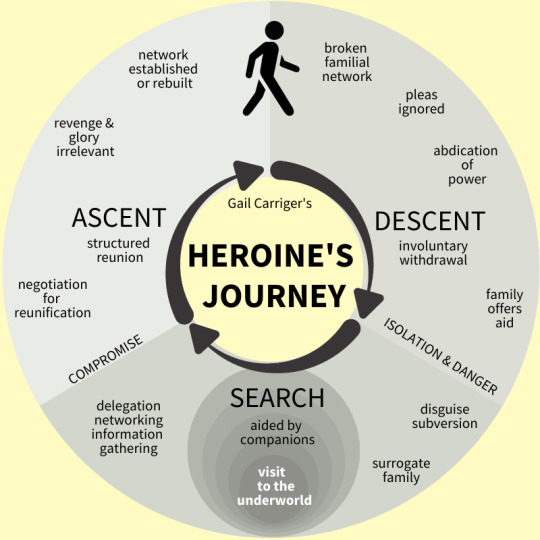
In her book, Gail notes that not every element has to be present to qualify a story as a Hero/Heroine's Journey and the events don't have to happen specifically in this order.
In the Heroine's Journey
The heroine's withdrawal is involuntary; something is broken and she must abdicate the power she had in order to rebuild, retrieve, or reunite with what was taken or broken.
Victory is a group effort; asking for help is a sign of strength; and the protagonist realizes that while she can't do everything herself, she has surrounded herself with people whose skills she can effectively deploy.
In the Heroine's Journey, the DESCENT is involuntary. Something is done to her or taken from her, and it breaks her familial network.
In ME2, obviously, uh, the thing that's taken from Shepard is her own life. Of course, instead of that being the end of the story, it's the inciting incident that leads to the involuntary withdrawal from her found family on the Normandy, her connection to the Alliance, and her Spectre status. Her home is literally destroyed. And then, kinda hilariously, she wakes up in the literal underworld. You know. Cerberus, dog that guards the gates of Hades?
I play a very Paragon Shepard and haven't played Renegade, so I can't speak to that. However, I can tell you that my Paragon Shep wakes up working for Cerberus and promptly proceeds to gain more Renegade points in the first couple of missions--hell, the first couple of conversations with Miranda, Jacob, and TIM--than she got in all of ME1.
Jacob: Do you trust me, Shepard? Shepard: NO, omg.
I've probably played ME2 five or six times with this Shepard, and she always strikes me as a bit off, a bit manic even, until she sees Tali. And she doesn't really start to settle or feel like herself until Archangel takes off his helmet, believes she is who she says she is, and without hesitation agrees to follow her into hell.
(As the protagonist in his own story, Garrus is also a heroine on a Heroine's Journey, by the by. Shepard's death breaks his network; C-Sec and the Council's denial of the Reapers leads to his abdication of power in the hunt for justice. His underworld is Omega. He puts together a surrogate family to fight injustice; he learns to delegate; he doesn't do it for glory... And then Sidonis's betrayal breaks the new family and sends him on another cycle. My theory, however, is that if you let him kill Sidonis, his journey takes on the revenge aspect of a Hero's Journey instead of the family and reunification structure of a Heroine's Journey.)
In ME2, the arc of recruiting an ally, earning their loyalty, and deploying their suggestions to improve the entire team's chances of survival is repeated over and over; this is the SEARCH of the cycle. And anyone who's ever tried to race their way through ME2 without doing all those loyalty missions or without scanning all those planets for resources finds out pretty quick why they're important.
So, while you potentially could race through ME1 without even recruiting several teammates (did you even know you can play that game without recruiting Garrus???), thereby making it much more of a Hero's Journey of the Strength of the Individual, you really can't do that in ME2 without massive casualties. You need the people around you. You need to build relationships. And you need to learn to delegate well, or things will absolutely fall apart during the end run.
Even the stated mission of ME2 is more Heroine's Journey. You're not fighting for glory; in fact, most of the people who used to be in awe of you now think you're a crazy terrorist. You're fighting to stop what's happening to human colonists.
The end run is so satisfying specifically because it leans in to the Heroine's Journey of information gathering and network building. You cannot beat the game as a solitary soldier. You cannot achieve a good outcome--minimal deaths, etc.--without having spent a lot of time and effort gaining the loyalty of your crew and then knowing how to deploy them to best serve the whole team.
ME2 is a story about finding and building a family after the last one is broken.
And though it's a whole other can of worms, I actually think the reason why the ending of ME3 was ultimately so unsatisfying for so many (again, not all) is because the majority of the game is once again a Heroine's Journey--team building and information gathering across the galaxy--but the endgame pulls the expected narrative out from under you. Instead of actually using the resources you've so carefully built, you're quite literally beamed up into complete isolation (weakness) and left to make a choice in isolation. It breaks the narrative promise that's been set up since the beginning of the game. And, whether you realize it or not, that's a huge part of why that lonely choice feels so hollow. Instead of a structured reunion and a rebuilt network, it's actually the broken family and involuntary descent that heralds the beginning of a new Heroine's Journey--not the the end of a successful one.
Also, incidentally? It's Heroine's Journeys that usually get satisfying instead of distracting-the-hero-from-his-real-mission romance, banter, fully realized side characters, and humor.
#mass effect#the heroine's journey#mass effect meta#commander shepard#garrus vakarian#turns out i love heroine's journeys much much more than i like hero's journeys#long text post#story structure#narrative structure#and this is why we get mad when stories don't meet the expectations they've set up#i could talk about this forever but i have a yoga class to get to asap
219 notes
·
View notes
Text
Clear Sky is a Monster.
Of all the characters in Warrior Cats, I think Clear Sky was the most heavily mishandled.
At every turn, the narrative begs you to sympathize with him, to "understand" the "misunderstood." To this end, his brother Gray Wing is used to "keep faith" in his inherent goodness, his abused son, Thunder, is forced to go back to him over and over, and his second dead wife is completely lobotomized in death to absolve him of all sin.
Because of this, of all this set-up for the "redemption" arc they're trying to tell in the last three books, DOTC is Clear Sky's story. Everything primarily exists to benefit and serve his arc. Thunder and Gray Wing might have POVs, but HE is the character who truly drives the plot. So in order to HAVE conflict for that back half, two evil foreign cats, Slash and One Eye, are summoned to act as contrast.
Their narrative purpose is to display "true evil" to make Clear Sky look less bad in comparison. Unfortunately, Clear Sky is the most malignant, deadly character who has ever blighted Warrior Cats.
The "pure evil" examples they summon aren't effective contrasts because they're flat. Clear Sky is what real abusers look like.
His rhetoric is what it sounds like when a cult leader is trying to keep control over a group. He lies when it benefits him, justifies his actions with his tragic backstory to assuage his guilt and manipulate others, and violently lashes out when his feelings are hurt before blaming his victim for making him angry.
He only made "some mistakes" in that SOME of his actions were accidents-- the vast majority of them were malicious, self-absorbed, intentional choices to punish, hurt, and kill others.
I've spoken about Bumble. I've tallied his body count next to Tigerstar. I've talked about how his infant son's death was his fault in sequel books, and called attention to the infected wound face shoving scene that no one talks about. I can't fit every detail into a single post-- because he's so rancid that I would practically be posting entire books.
So what I want to do here is tackle the heart of Clear Sky. Everything he does, everything he's motivated by, is absolute and utter control over other people. He leverages his "trauma" to evoke empathy from his targets to make them easier to manipulate. He's a dirty liar. He breaks down to physical violence when all other tactics stop working.
He's one of the most severe and realistic abusers I've ever read about outside of very adult literature-- and when I read the reasons why he's attracted to Star Flower, my stomach immediately lurched.
The Killing of Misty
Starvation Rhetoric and the Memory of Fluttering Bird
Aside; a question
Hunger as a punishment; he doesn't care about starvation
Exoneration arc
Predation: Star Flower is a replacement for his son.
I think that index is an evocative content warning. But to say it again; this post contains child and domestic abuse, physical assault, public humiliation, incestuous grooming implications, and a lot of murder.
I need to start with the death of Misty. I see a few people saying that Clear Sky killed her for "being on his land" or trespassing, but this is actually a misstatement that I feel is important to correct.
Misty and her children were on their own land. It was her house. Clear Sky killed her to take it.
This is one of the most important details to remember about Clear Sky, that this is the consistent end point of his obsessive need for power and control. By harassment, by violence, or by death, he will brutalize anyone who does not give him what he wants, or who makes him feel bad, and find some way to justify it.
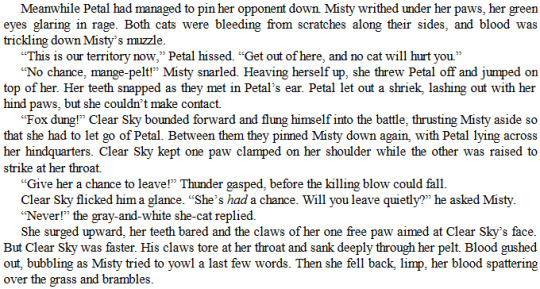
This territory expansion was for no logical reason. There was plenty of food and plenty of land. Any aggression that's happening on this territory is in response to how he's been stealing land and mauling people.
When it's found out she was fighting to defend her children, Clear Sky's immediate response is to slaughter them too.
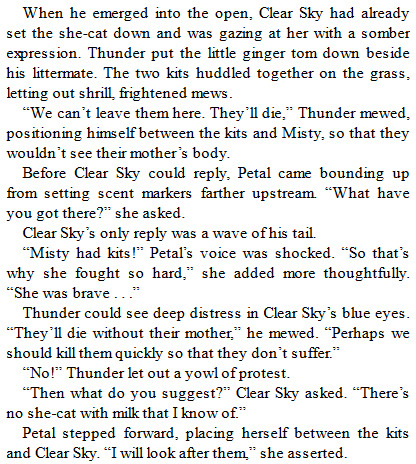
Petal doesn't have milk either. It wasn't about the logistics. He wanted to kill the kids, because looking at them made him feel bad, and she just managed to stop him.
Starvation Rhetoric and the Image of Fluttering Bird
It is often said that Clear Sky is doing this because he's "traumatized" from how his little sister, Fluttering Bird, starved to death in the mountains. That the emotion came from wanting to feed people. That's incorrect. It wasn't about food. Fluttering Bird's death, and all the "starvation" he's faced, are used as manipulation tactics to guilt, influence, and control other characters, particularly when he might meet resistance or be held accountable for something.
It was always, ALWAYS, about control.
He does not care about actually helping people; "Starvation Rhetoric" through Fluttering Bird is an image he can invoke to justify the actions that are as bloody and cruel as the one this post starts off with. Either in his own mind, or in the minds of the cats he's manipulating.
He does this to Falling Feather, before slicing her face open in anger when she doesn't buy it. He does it to Rainswept Flower, before he strangles her to death. And he does it in the chapter just before Misty's murder, both to his Clan and then to Thunder,

Clear Sky climbed up in front of an entire crowd and gave a grand speech about hunger and "adjusting" the borders around territory he plans to conquer. When he gets to "forgiveness" he feigns pain to make his point because he is performing. If the sentiment is not a total lie, then at bare minimum, he is intentionally playing this up for the crowd.
He is rallying the Clan to support his violence against the cats whose land he wants to steal, and selling it with his life's hardships.
The audience is clearly well-trained, because several cats recognize the cue, particularly Frost who is praised for loudly comforting him. This signals "loyalty" because showing your sympathy towards his "suffering" is how this type of emotional manipulation works. It creates a persecuted, righteous in-group.
He's also apparently used this tactic before, since this entire crowd knows what "I Would Never Forgive Myself " means.
He's made sycophants out of his followers. Like a cult leader.
His abused son, however, hasn't been fully indoctrinated yet. Seeing Thunder uncomfortable with the idea of expanding the borders for no reason, Clear Sky calls him over for a personal propaganda session.
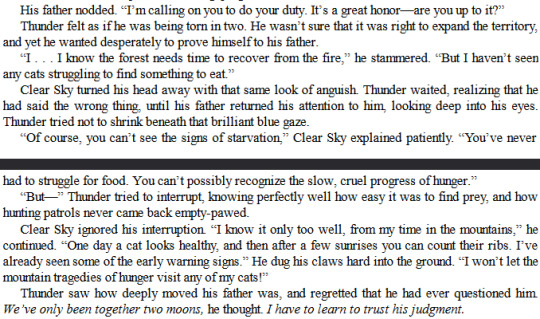
Clear Sky begins the exchange by calling this a "duty" and a "great honor." Immediately framing what he plans to do as righteous.
He puts on the act when Thunder shows resistance, dramatically pausing to let the guilt trip sink in.
"Thunder waited, realizing that he said the wrong thing."
And then Clear Sky launches into infantilizing Thunder, talking down to him like a child who's too inexperienced to see the "signs of starvation," acting like he's being "patient" in "explaining" it.
And then we get it. "I know what starvation looks like (so stop trusting your own eyes) because I have been through more than you (so shut up and do what I tell you), and I'm being a HERO for what I'm about to do (so opposing me would make you a bad person)."
Thanks to these crocodile tears, looking "moved," the act works. The victim is immediately wracked by guilt because the abuser seems genuinely emotional.
He even lovebombs him over the corpse of Misty in the next chapter, making Thunder feel threatened.
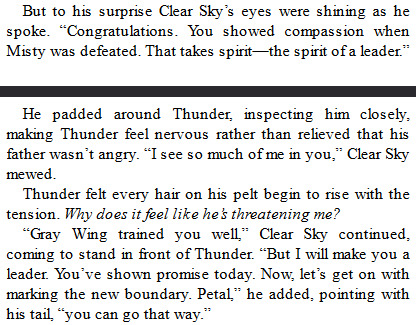
Thunder doesn't have the words to describe what is happening to him, but he knows that this sudden snap to praise isn't natural. That something is very wrong.
A Question.
Before I move on to show that this IS an act, and that he is lying about how important avoiding starvation is to him, I will ask a question. Please think about it, because I promise I mean it genuinely;
Why does it matter if Clear Sky actually believes this or not?
The victims are just as dead either way, yes? Thunder is just as abused and guilt tripped. The entire Clan has been driven towards violence while coddling and cooing at their Supreme Leader. Clear Sky is slowly annexing the entire forest. If you have ever accepted that he had "good intentions" as an excuse for the harm he did, or that abuse and murder was what he imagined was "the right thing," or that his trauma justifies the way he leverages his own pain to make cats do what he wants... why do you think that?
Why does that make it morally better, as the narrative concludes? Would you accept the same for every other WC villain or antagonist? Tigerstar? Slash? Tom the Wifebeater? Brokenstar? Rainflower?
How could you tell the difference, if you couldn't read their actual thoughts on the page? ...are there any other "good intentions" you've accepted, somewhere else?
Don't share that answer with me. It's a question for you. Sit with it.
Hunger as a punishment; he doesn't care about starvation.
...but, regardless, Clear Sky is not deluded about starvation. It's a justification for his obsessive need for control, and always has been. There was no shortage before stealing Misty's land and kits, he is fully aware that there's more prey than they can eat.
He punishes Falling Feather with hunger and harassment for thought crime, by briefly thinking of leaving. But first, he invokes Fluttering Bird at her like he did before, flying into a screeching fit of rage when she doesn't buy it,
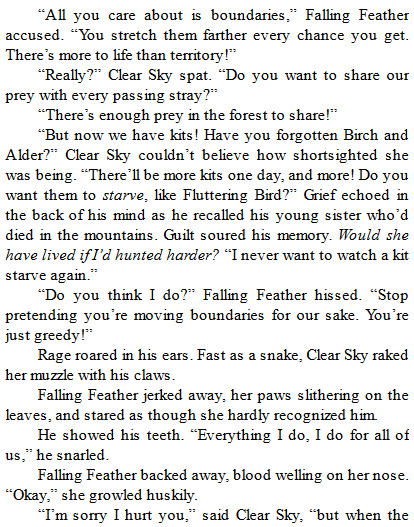
"I'm sorry I hurt you... BUT" is THE wifebeater phrase. THE stereotypical line of a domestic abuser. "I'm sorry I hit you... but it's your fault for making me so angry."
She went through the same exact starvation he did, calls out that he's just framing his greed as being for the collective benefit of his subjects, and is assaulted for that.
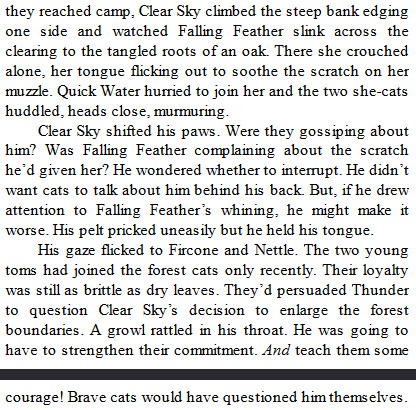
When we're in his head, we see his REAL concerns are not about hunger. He invoked Fluttering Bird to try and make her shut up and bow down to him; what he's focused on is her "gossiping" and "whining" about the open wound he left on her face. He's still furious at Fircone and Nettle for how Thunder QUESTIONED him. So he will "strengthen their commitment."
When "starvation" DOES enter his thoughts, it is to assuage his own guilt and JUSTIFY what he already did. What he already WANTS to do. It's post-hoc.
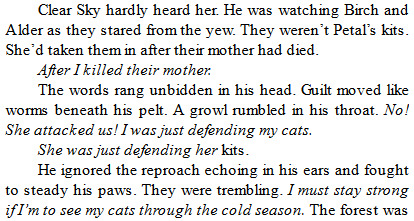
He had to suppress his own guilt at how his greed and ambition made these children into orphans, completely unable to admit that he's ever been wrong or has a change to make, so he invokes the starvation rhetoric at himself to excuse it. So he feels less bad.
Everything, EVERYTHING, in this confrontation is about his pleasure at being able to torment his subordinates. To continue the abuse when the initial confrontation is over. If it isn't pride in his power and control over them, it's plain sadism.
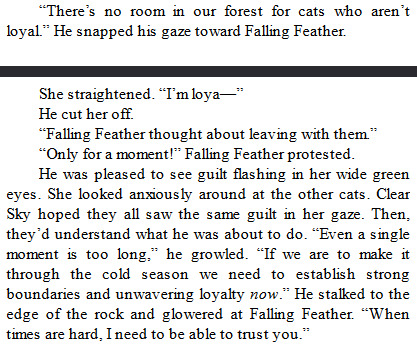
He invokes starvation in front of the crowd, again, after being pleasured at the guilt in her eyes, hoping that everyone sees her writhing with shame and embarrassment. Fear wasn't at the root of why he assaulted Falling Feather; rage was, and now he feels better that he got to humiliate the person who offended him.
Starvation Rhetoric is a manipulation tactic.
It goes RIGHT BACK to his twisted idea of "loyalty." Obedience.
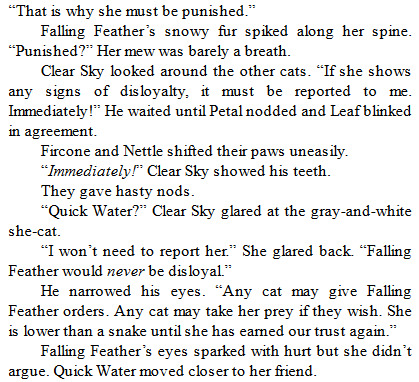
A cat who's actually, primarily concerned about starvation wouldn't encourage other cats to steal her food if they feel like it. He wouldn't be using it as a weapon to retaliate against her because she hurt his feelings.
This is paired with the fact he restricts and monitors the diet of his cats. They eat when he allows it, and only what he gives them, in spite of there being piles of dead animals rotting, going to waste.

We then find he personally doles out food from these piles, plucking carcasses off them and flinging them at his cats, one by one. Probably so he can watch how grateful they are to him and make sure they stay a little hungry-- and definitely because it means he can control WHO gets to eat at all.
If Clear Sky chucked a mouse at Falling Feather and someone took it? She would have gone hungry. For not groveling to him. Like when he decides to starve her brother; a hostage who he promised to feed and care for.
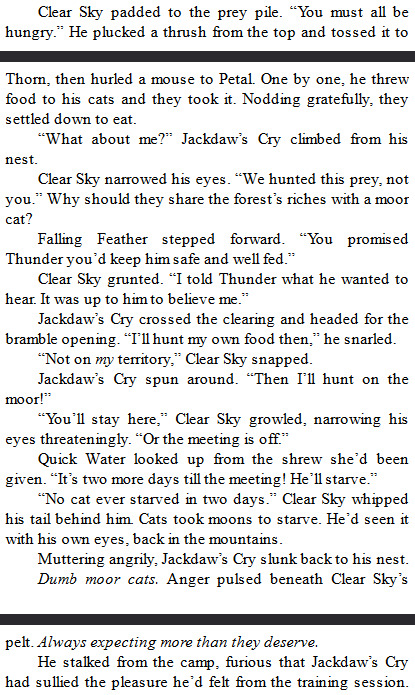
He's a dishonest snake. He lied about abandoning baby Thunder, calling it a "test of strength," he lied about Bumble's death, he lied about keeping Jackdaw's Cry fed.
And he lied about starvation to Thunder, because he was just making up an excuse to steal more land.
He wasn't "seeing the signs" of starvation when he moved to "adjust" his borders. Even FURTHER into this so-called "delusional slip" into tyranny, he's freely admitting that it takes months for a person to starve when it benefits his sadistic need to punish undeserving cats.
"Dumb moor cats, always expecting more than they DESERVE."
Not need. DESERVE. It's not a delusion about starvation and it never was. STARVATION is how he CONTROLS SkyClan, and once again he's angry that his pleasure has been sullied.
The massacre at Fourtrees was started over Jackdaw's Cry catching a bat after being starved, on land that Clear Sky has decided RIGHT NOW that he also owns, because it mades him think about being disobeyed.

The bat is forgotten as Clear Sky pivots into a tantrum, wanting to make his family HURT for being 'disloyal' and 'ungrateful.' For leaving him. He LIKES seeing people grovel, cower, and beg, getting PLEASURE from watching how he can hurt and command other cats, and if you don't give him what he wants he will kill you.
Which, make no mistake, is what the "First Battle" actually is. Clear Sky attempting to murder those who don't worship him or swear their undying fealty to him and his twisted dictatorship. Particularly his own son, the most prominent victim of his emotional abuse.
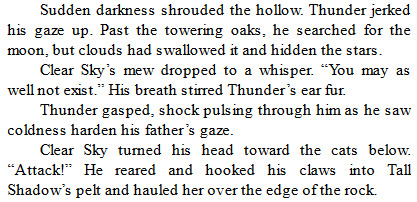

It's not about the bat. It was never even about food or starvation. It's about retaliation for any perceived lack of control.
Once again he breaks out starvation rhetoric to try and manipulate someone, and when Rainswept Flower doesn't buy it just like Falling Feather didn't, he murders her in another fit of entitled rage.
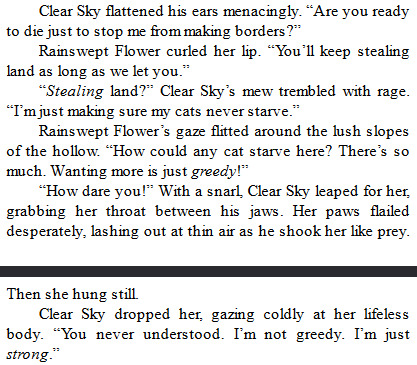
Exoneration arc.
At the end of this battle that was entirely his own fault, we're introduced to the hollowed-out ghost of Storm. She has been flushed of all personality, so that she can be the perfect narrative mouthpiece.
She accepts yet another Fluttering Bird Invocation in spite of how we saw it's not sincere. He was lying the entire time and using starvation rhetoric as a manipulation tactic to get control over his victims.
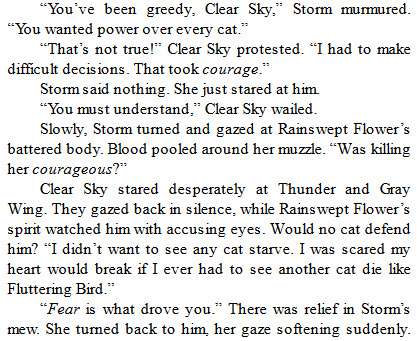
And that's it.
That's the consequence. Storm's a little mad at him until he says "Buttering Flird" and she swoons.
He doesn't have to be ""afraid"" anymore because the cats just invented an afterlife to believe in. He keeps all of his power and influence and gets off scot-free, because "guilt" (which we SAW him repressing anyway) is supposed to be the best consequence for murder, abuse, and tyranny.
The husk of Storm even materializes again at the end of book 5 to say it outright; he "never drove anyone away." Not even after Book 4 where it's also his fault One Eye took over his Clan for 5 minutes. It was just destiny.
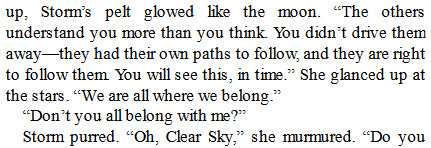
His "redemption arc" is just an exoneration arc. The narrative doesn't think he really did anything wrong.
EVERYTHING about Clear Sky has ALWAYS been about making grabs at power, but since the narrative didn't see a problem with him extorting his personal tragedy and the death of a child, his own sister, he continues doing it. As if these behaviors are normal personality 'traits'.
Even when that sister COMES OUT OF HEAVEN TO YELL AT HIM DIRECTLY,
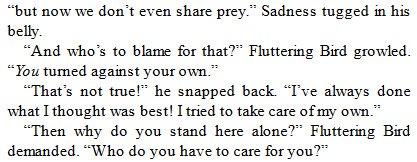
He finds a way to COMPLETELY miss the point, so he can interpret her words in a bizarrely specific way that will conveniently end with him being the supreme dictator of the entire forest. Just like he ALWAYS does.
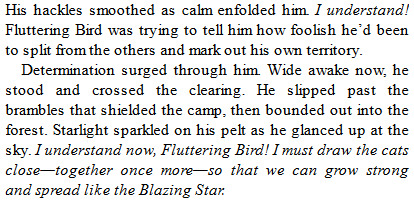
It's the entire 5th book. Clear Sky trying to convince everyone, including himself, that it's Fluttering Bird who wants him to grab at power, NOT himself and his own ambition, that THIS time, he promises, for realsies, it's actually about keeping everyone safe.
But just like ALWAYS, because he does not change, when this tried and true tactic manages to work on Thunder, during ANOTHER exchange where he's dramatically pausing and using the cold shoulder to make his pitiable act land harder,

He lapses right back into bullying his child, creating situations where Thunder will have difficulty or be put in pain, so that he can have an excuse to mock and belittle him.
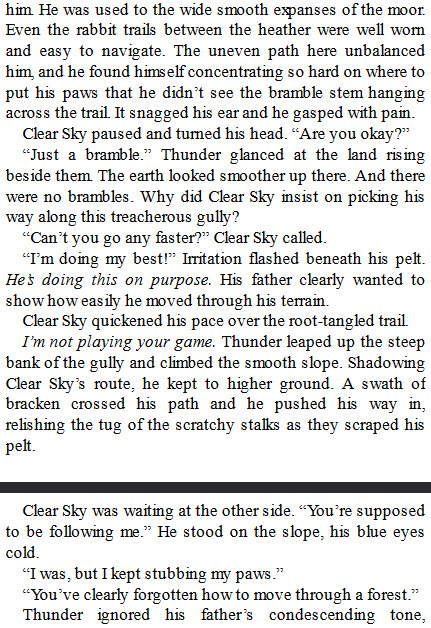
And this all comes to a head when Clear Sky takes romantic interest in Star Flower, his abused son's previous romantic interest.
Predation: Star Flower is a replacement for his son.
Direct parallels are drawn between Thunder and Star Flower. Star Flower contrasts her loyalty to her father to Thunder's "disloyalty" to his own, in an appeal to Clear Sky.
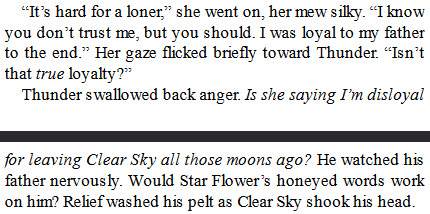
Clear Sky brushes it off for now, citing that he cannot accept her because of who her father was.
But then, Thunder makes the connection between himself and her, because he knows what it is like to be a victim of parental abuse and correctly clocks that they have this in common,

On his vouch, Clear Sky accepts her into the group. She starts trying to offer himself to him; hunting twice as hard as the others, self-imposing harsh conditions like taking a wet sleeping spot. In their second interaction, Clear Sky begins to take interest in her.
Thunder himself points out that Star Flower is seeking an abusive tyrant to replace her own father, which reads like he's deflecting the stress of how his father is abusing him to deny a connection he already made. As if Thunder sees so much of himself in Star Flower that it makes him (rightly) feel sick that his father is romantically invested in her;

Thunder then goes on to follow his own advice and form his own Clan, because Clear Sky IS like One Eye... while Star Flower remains here. At Clear Sky's side. Because she feels like this is what she "deserves," that she "understands" him, truly believing that her crime (warning her father that Clear Sky brought an ambush in case he lost the 1 on 1 death match he requested, which he did) are on the same level as his abuse and murders.
Clear Sky is attracted to Star Flower because, in his own words;

She is young.

She will not betray him.

She won't question him,
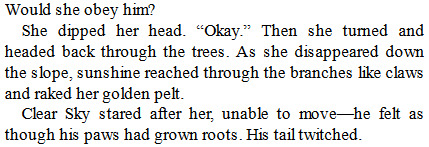
and she obeys him.
We've seen what "betrayal" is to Clear Sky-- not taking his excuses or his beatings. To "disobey" is betrayal. To "question" is disobedience.
These are ALL things he's tried to drill into Thunder. We saw him happily exploit their difference in age to tell him he can't have an opinion. He constructed humiliating games in retaliation for ever being questioned. He tried to murder Thunder and his friends for their "betrayal." Even now, being disobeyed causes explosive reactions.
He was previously grooming the things he now identifies as attractive in a young woman into his child.
If your body becomes too useless to serve him, like Frost and Jagged Peak, you're thrown out. If you don't unquestioningly follow his bloody commands, like Falling Feather or Thunder, you're subjected to abuse and public humiliation. If you're in his way, like Misty or Rainswept Flower were, you die.
If you meet all of his expectations...

You will be in a horrific position where you will never have agency over your own life ever again. Every move, every word, will have to be carefully crafted so that he feels like you're "loyal" to him by the arbitrary standard he feels that day. Never step out of line, never doubt his decisions, never live for anyone except him and the children you will give him, not even for a moment, because then you will not be "worthy" of his grace.
Star Flower would be in serious danger if this series wasn't written by abuse apologists. They accidentally wrote a perfect reflection of how child abuse victims often find themselves in unsafe and toxic romantic relationships with large age gaps which mirror what they went through as kids; but this team doesn't clock it, playing this relationship as wholesome and genuine.
He finally has someone who ""understands"" him. Because they think the character they wrote is misunderstood.
but reality is plain to see.
Clear Sky is a monster. The most realistic monster in all of WC-- far, far closer to real life predators and domestic abusers than the "born evil" rogues like Slash and One Eye. The Erins seem to believe that what separates Clear Sky from One Eye is "fundamental" good and "fundamental" evil, when the truth is that they'd be separated by very, very little.
If they had realistic motivations, they would be exactly like the character their existence is meant to excuse.
Slash and One Eye HAD to be kept flat and one-dimensional. If the book was more earnest, the only difference between Clear Sky and One Eye would have been that One Eye is stronger. So strong that Clear Sky needed to manipulate the other groups into helping him.
While anyone can change, not everyone will, and Clear Sky has no reason to. He sees no consequences. He has everything he wants; power, a pretty and obedient young mate, and unchecked authority over a brainwashed forest cult. There is always a victim on a leash, a naive enabler, or a bunch of desperate and gullible marks somewhere in his proximity to bully into doing his dirtywork
Whether his "intentions" were sincere or not (evidence points towards not) at its root it was always about control. Power is something he perpetually keeps, and continues to violently use.
#Cw incest#Incest implication#Child abuse#Cw child abuse#Domestic abuse#Cw domestic abuse#Clear Sky#Warrrior cats analysis#Clear Sky wc#Star Flower#Dotc hate#Star Flower wc#Thunderstar#Cw Abuse#Abuse#Cw grooming#Grooming#Ask to tag#I know this is a really fucking heavy one#I had several people read this for me beforehand to double and triple check what I'd written.#And im relieved that it's finally finished.
450 notes
·
View notes
Text
This is going to sound so pretentious to say, but I think that one of the most incredible things Emerald Fennell did with Saltburn was give it's audience both everything and nothing all at once. But which I mean that every moment we see on screen is so carefully chosen and wonderfully detailed. Every second of the story that Oliver chooses to tell us is perfectly crafted to give us the exact story he wants to create, nothing more and nothing less. Saltburn's narrative lives and dies in Oliver's obsessive recollection, his confessional. Its why these characters who are so clearly and wonderfully rich below the surface can, at a glance, come off as shallow. Oliver didn't care!! And the one he did care about, he gatekept so jealously (I saw someone else's meta discussing this and I absolutely agree) to the point where we as an audience barely know who Felix was. We don't even know who Oliver was, at the end of the day; he was manipulative and ambitious and obsessive and - I could not tell you a single thing he genuinely liked that wasn't Felix. Because that's it, isn't it. That's the story of Saltburn. Everything revolved around Felix, and Felix was everything, and so Oliver's story only focuses on the absolute tragedy of having everything and then losing everything in that one Summer.
And nothing else.
Emerald gave us the gift of Oliver's everything, and the vague, nebulous nothing that he cares about just behind it. The hints of more, jumping off points of intrigue and imagination, things we can extrapolate from and speculate about. There is so much room in this world around it's implications and offhand remarks for us to all build upon. We don't even know if Venetia is Felix's older or younger sister???? There is limitless space to play in this world, both before the events of the film, but also between the few moments Oliver chooses to show us. We see twenty minutes of Oliver's Full First Year at Oxford before he goes to Saltburn, so much of how he falls for Felix and becomes his friend goes so unsaid and unseen, little more than a montage, and Barry and Jacobs's phenomenal chemistry selling their closeness, so we don't have to know each detail.
But that's the thing, that's just bliss; the falling in love is a given in this story, he opens with that. These moments would simply be nothing on the road to everything.
Its like Emerald Fennell is kissing me directly on the forehead and giving her blessing to fill in the blanks. She knew we would; she literally said she knew Saltburn would be a hit on Tumblr, she knew what she was doing. This film was made for those of us who like to over analyse media and also create vivid and intricate headcanons and sometimes both at the same time.
Tumblr, and creatives especially, love Saltburn because it deliberately lets us play in its world, in that sweet spot between everything and nothing, all at once.
#saltburn#saltburn 2023#saltburn meta#felix catton#oliver quick#venetia catton#farleigh start#emerald fennell#elspeth catton#sir james catton#james catton#felix x oliver#felix catton x oliver quick#manicpixieart
332 notes
·
View notes
Text
The Hero with Dead Parents is not Cliché, it’s Necessary
The staggering number of protagonists in sci-fi and fantasy with dead parents grows every single year. Frodo Baggins, Harry Potter, Luke Skywalker (before the retcon in ESB), almost every Disney Prince and Princess, the Baudelaire children. Beyond the realm of fantasy into action, thriller, romance, mystery, slice-of-life, and bildungsromans.
Dead parents, or parent, is the curse of being the hero of the story and for a very good reason:
Parents are inconvenient as f*ck.
Unless the mom and/or dad is the villain of the story or the entire story is about the relationship with the parent/parents, the “dead parent” trope serves many purposes and while it may be “cliché” that doesn’t mean this trope is bad or, in my opinion, overused.
It’s one less liability the hero has to worry about protecting
It’s one less obstacle in the hero’s path to their adventure
It’s one (or two) less characters to find excuses to stay relevant in the story
It’s a juicy backstory a lot of people can relate to
Trauma. Is. Compelling.
It’s an excellent motivation
And their murder is an excellent inciting incident
Living parents and guardians get killed off both for internal plot reasons, and meta writing reasons: Living parents are a pain in the ass to keep up with. You’re stuck with a character your hero should still keep caring about, keep thinking about, keep acting in relation to how their actions will be seen and judged by that parent. That parent becomes an obvious liability by any villain who notices or cares.
Living parents can of course be done well, unless they’re the villain, but they just kind of sit there on the fringes of the plot, waiting around to be relevant again and they kind of come in four flavors:
There when the plot demands for pie and forehead kisses (Sally from Percy Jackson)
A suffocating but well-meaning obstacle in between the character and their independence trying to do right (Abby from The 100, Katniss’ mom from Hunger Games, Spirit from Soul Eater)
A mentor figure (Valka from HTTYD 2, Hakoda from ATLA)
The only rock this character has left (Ping from Kung Fu Panda)
*Notice how many of my examples lost their partners shortly before or during the plot, thus still giving the hero the “dead parent” label.
Most of these are self-explanatory so I’ll say this: I think this trope gets exhausting when the parents are written out without enough emotional impact on the hero. These are their parents and a lot of the time, the emotional toll of losing them isn’t there, like just slapping a “dead parents” sticker is all you need to justify a character’s tragic backstory and any behavioral issues they might have.
Like, yes, the hero has dead parents, but you still have to tell me what that means to them beyond obligate angst and sadness. When the “dead parents” trope reads as very by-the-numbers, usually the rest of the story is, too.
How present the parents were in the character’s life should be proportional to the death’s impact on the narrative (as with any character you kill off). If they were virtually nonexistent? No need to waste a ton of time. If they didn’t matter to the character before, they don’t need to matter now unless the plot revolves around some knowledge or secret their parent never shared.
Sometimes, the hero’s dead parents are a non issue. Frodo being raised by Bilbo doesn’t impact his character at all. It’s a detail given and tossed away. On the other hand, sometimes the entire centerpiece of the work is revenge/justice/catharsis surrounding the parent’s death—Edward and Alphonse Elric’s entire story is defined by the consequences of trying to bring their mother back from the dead.
As someone who kept one of my protagonist’s parents alive and didn’t make them villains just to spite the trope, I have all the more respect for this enduring legacy of fiction. You can of course keep the parents alive, but I don't think it's seen as lazy or cheating or taking a shortcut just killing them off, so long as you remember that your hero is human and should react to losing them like a real person.
#writing advice#writing resources#writing tips#writing tools#writing a book#writing#writeblr#character design#character development#fantasy#scifi#dead parents
199 notes
·
View notes
Text





from In the Dream House by Carmen Maria Machado (2019)
In Dorothy Allison’s short story “Violence Against Women Begins at Home,” a group of lesbian friends gathers for a drink and they discuss a bit of community gossip: a pair of women recently broke into another woman’s house and trashed it, smashing glass and dishes and destroying her art, which they deemed pornographic. They spray-painted the story’s eponymous phrase on her wall. The friends debate police involvement and intragroup conflict mediation; but toward the end of the story, as they are parting ways, the problem crystallizes into a single, telling exchange:
“Look, do you think maybe we could hold a rent party for Jackie, get her some money to fix her place back up?”
Paula looks impatient and starts gathering up her stuff. “Oh, I don’t think we should do that. Not while they’re still in arbitration. And anyway, we have so many important things we have to raise money for this spring—community things.”
“Jackie’s a part of the community,” I hear myself say.
“Well, of course.” Paula stands up. “We all are.” The look she gives me makes me wonder if she really believes that, but she’s gone before I can say anything else.
Queer folks fail each other too. This seems like an obvious thing to say; it is not, for example, a surprise to nonwhite queers or trans queers that intracommunity loyalty goes only so far, especially when it must confront the hegemony of the state. But even within ostensibly parallel power dynamics, the desire to save face, to present a narrative of uniform morality, can defeat every other interest.
The queer community has long used the rhetoric of gender roles as a way of absolving queer women from responsibility for domestic abuse. Which is not to say that activists and academics didn’t try. When the conversation about queer domestic abuse took hold in the early 1980s, activists gave out fact sheets at conferences and festivals to dispel myths about queer abuse. [see footnote 45] Scholars distributed questionnaires to get a sense of the scope of the problem. [see footnote 46] Fierce debates were waged in the pages of queer periodicals.
But some lesbians tried to restrict the definition of abuse to men’s actions. Butches might abuse their femmes, but only because of their adopted masculinity. Abusers were using “male privilege.” (To borrow lesbian critic Andrea Long Chu’s phrase, they were guilty of “[smuggling patriarchy] into lesbian utopia.”) Some argued that consensual S&M was part of the problem. Women who were women did not abuse their girlfriends; proper lesbians would never do such a thing. [see footnote 47] There was also the narrative that it was, simply, complicated. The burden of the pressure of straight society! Lesbians abuse each other!
Many people argued that the issue needed to be handled within their own communities. Ink was spilled in the service of decentering victims, and abusers often operated with impunity. In an early lesbian domestic abuse trial, a lawyer noted the odd and unsettling detail that most of the time the jury spent behind closed doors was—contrary to what she’d been worried about—the straight jurors attempting to convince the jury’s sole lesbian member of the defendant’s guilt. When she was later questioned, the lesbian juror told the lawyer that she hadn’t “wanted to convict a [queer] sister,” as though the abused girlfriend was not herself a fellow queer woman.
Around and around they went, circling essential truths that no one wanted to look at directly, as if they were the sun: Women could abuse other women. Women have abused other women. And queers needed to take this issue seriously, because no one else would.
footnote 45: Among the myths tackled by the Santa Cruz Women’s Self Defense Teaching Cooperative: “Myth: It’s only emotional/psychological, so that doesn’t count.” “Myth: I can handle it—unlike her last three lovers.” “Myth: Staying together and working it out is most important.” “Myth: We’re in therapy, so it’ll get fixed now.”
footnote 46: Actual questionnaire language by researcher Alice J. McKinzie: “Is your abuser present at this festival? If your abuser is at this festival, is she present while you are filling this out? If your abuser is not present while you are filling this out, is she aware that you are filling out this questionnaire? If you answered NO to the question above … do you plan to tell her later?”
footnote 47: This No True Scotsman fallacy could bend these narratives in every direction conceivable; create a kind of moving goalpost that permitted an endless warping of accountability. In a firsthand account of her abuse in Gay Community News in 1988, a survivor wrote: “I had been around lesbians since I was a teenager, and although some of them had troubled relationships, I was unaware of any battering. I attached myself to the comforting myth that lesbians don’t batter. Much later, when I was ‘out’ enough to go to gay bars in a town that was liberal enough to tolerate them, I saw that some lesbians did indeed batter. However, I thought they were all of a type—drunks, sexist butches or apolitical lesbians—so I decided that feminist lesbians don’t batter.” Activist Ann Russo put it more succinctly in her book Taking Back Our Lives: “I had found it hard to name abuse in lesbian relationships as a political issue with structural roots.”
#carmen maria machado#in the dream house#quotes#dorothy allison#intimate partner violence#domestic violence#domestic abuse#queer abuse#abusive relationship#image described#mac’s bookshelf
122 notes
·
View notes
Text
#RWRBMovie: Designing the sex scenes
“We need to make sure that it is unambiguous to anyone watching this scene what precisely is happening,” he says. “We’re going to be accurate to the body positioning, to the breath, to the moment of insertion.” Working with intimacy coordinator Robbie Taylor Hunt, López thought through every possible detail about how two men have sex — and what about that process needed to make it into the scene: “We talked about, ‘Does the prince douche before they go in? Do we need to tell the audience that? Does the audience just assume that that’s going on?’” A great deal of time was spent on whether Prince Henry would be on PrEP, a medication taken to prevent HIV infection during sex. “Robbie and I decided together that the prince is probably not on PrEP, because it would be too dangerous for him to ask for prescription,” López says. “So the prince absolutely uses condoms. And because we couldn’t really effectively answer the PrEP question narratively, we wanted to also just tell the story that the prince engages in safe sex practices and takes his sexual health seriously.” Eagle-eyed viewers have indeed caught sight of condom wrappers near Henry and Alex’s bed during a couple of points in the film — alongside a bottle of lube. “Once we had passed a certain part in the story, I was like, OK, let’s empty out some of the lube,’” López says. “Robbie and I were looking at it, like, ‘How much would they use? Like, well, let’s take it down about this much. OK, that makes sense to me.’” It was also vitally important to López to block out every beat of the sex scene in Paris. “Days before we shot that scene, Robbie and I actually got into the bed together,” the director says through laughter. “There are videos that could, like, ruin both our careers. Because we were like, ‘Alright, we’re having sex. What are we going to do? Okay, this pillow goes here. The condom’s going to land here. I’m going to do this.’ We probably overdid it in terms of the preparation for the scene. But we also wanted to make sure that we got on to set and we had an answer for every conceivable question.” The opportunity to show two men having sex in what amounts to a major studio romantic comedy was not lost on López. “I’d be a liar if I told you there wasn’t strategy to the scene, that I didn’t want to cause a conversation about why they’ve never seen this scene in a studio film,” he says. But he was also keenly aware of what he was asking of his actors. “Look, I don’t know if I could do it,” he says. “I’m fully aware that I’m asking two actors to do something that I’m probably not willing to do. I better make sure that I’m not wasting their time, that I’m not making them feel exploited, and that they are included in every single decision, every step of the way. It’s the only responsible way to do it. We knew that if Taylor and Nick didn’t feel safe, we would never have gotten that scene out of them.”
606 notes
·
View notes
Text
UNRELIABLE NARRATORS; SEMI FINALS

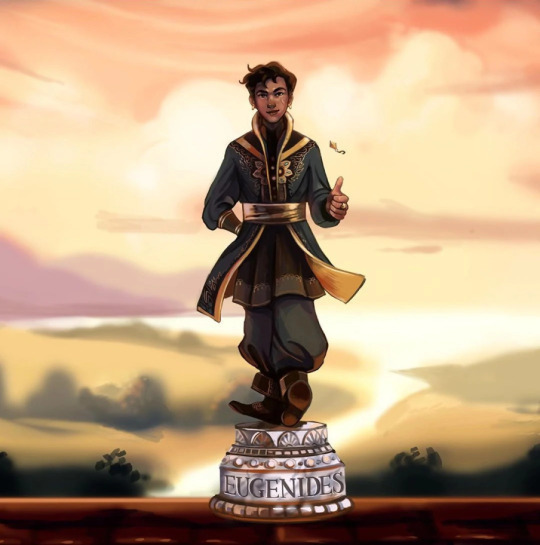
*NOTE; propaganda is out of order due to the post length!
Eugenides Propaganda:
the entire plot hinges on a detail he lets the reader (and every other character) assume is true. I don't want to spoil it because it's a really fun reveal but he is lying from the first second he appears on the page and you can't trust him to tell the full truth about ANYTHING related to himself and his goals. he mostly does it to keep his advantage and not have other characters be suspicious of him but it's just so fun when you realise he's been lying the whole time
Kim Dokja Propaganda:
I haven't read orv but he's fucking gotta be from what I've osmosised
He tries to remove his emotions out of the narrative soooo much, literally the most repressed guy ever. Okay so for context orv is about how this guy, Kim Dokja, has been the only reader of an obscure post-apocalyptic webnovel for years and the novel suddenly becomes reality. And at first you'll probably get the weird impression that his behavior is pretty strange for, you know, a literal apocalypse happening in his world - like yes, he is concerned with survival but he doesn't seem all that scared and he kinda treats it like a video game where he has to grind to make himself stronger and he also treats his companions like a party in an rpg. Then there's also the way he approaches the protagonist of the webnovel, from the start he just kind of describes him as a ruthless psychopath and jerk that is unfortunately a pretty useful ally. And also there's the fact that he carefully omits any mention of his past and when somebody asks if he's worried about his family when the apocalypse starts he just kinda... brushes it off? Anyway so yeah, this bastard is definitely traumatized, although I don't know how much of spoiler territory that would be, considering the fact that literally when he first reveals his trauma he's also unreliable about it. And turns out he does indeed, care A LOT about this world and the people around him. Because well, he kinda didn't care to mention that this webnovel that has become reality was like... literally his whole world before it literally became his whole world. Like, it was the only thing keeping him going for 10+ years and the protagonist that he likes to call a stupid jerk was his comfort character who he pretended to be when he felt like he couldn't handle something in his life by being himself. The protagonist is also canonically the person he loves the most according to a prophecy and he literally can't fathom the thought of him dying, even the timeline versions of him that directly oppose him. And I haven't even mentioned the Fourth Wall yet but I feel like this propaganda is a little long already
misreading the intentions of his companion (yoo joonghyuk) so many time.
YOU DON'T UNDERSTANDDD DOKJA IS SUCH A UNRELIABLE NARRATORRRRRR GOD I COULD WRITE AN ESSAY BUT I KNOW YOU LOVE DOKJA TOO BUT OMG HE'S JUST SO AAAAAAAAAAAH
Rest of Propaganda under cut!
he is the worst like actually. he starts the story talking about how normal and average he is. he is not. he is constantly mischaracterizing his friends and he's so good at lying to the readers that you don't even realize it at first. almost every single time he cries we have to be told by other characters because he never says it himself. there is literally a scene where his narration says "i wasn't crying" and then the in-universe entity that narrates the actions of people (orv is really weird and meta) says that he was, in fact, crying. honestly genuinely anything he says about himself (or doesn't say) cannot be trusted. he is just so frustrating. he drives me mad. i love him dearly. but he drives me so mad.
Dictionary definition of unreliable narrator. Does not tell the reader anything and then things happen and he's like oh yeah btw there was also this and this earlier but i just didn't feel like mentioning it. There's even a thing called the "Fourth Wall" that is able to see through kdj's bs so occasionally you get gems like,
Kim Dokja: I didn't cry
The Fourth Wall: [Kim Dokja was crying]
Imagine being so unreliable as a narrator you need a more powerful narrator to call out the actual narrator.
^ same submission, just spacing it out
This goes into spoiler territory, but; Kim Dokja is in possession of a skill called the Fourth Wall, which on the surface seems like it appears because he read the book that reverse-isekai’d into his own. However, as the story goes on it becomes clear that it’s pretty much a souped up version of his pre-existing dissociation. You cannot trust him to be honest about his feelings, his past traumas or his feelings about his past traumas, not to mention his tendency to just outright omit information that only gets revealed later on either when it becomes relevant or when an outsider POV reveals what’s actually happening.
Exhibit A: he says (in 1st person POV) that he’s not crying. The Fourth Wall immediately contradicts this (as it is literally words of the novel) by saying (in 3rd person POV) ‘Kim Dokja was crying’.
Exhibit B: Fails to mention entire actions when it shows him emotionally honest even in the slightest; we had to read from another character entirely when Kim Dokja was being physically affectionate with his companion. It’s so bad that there’s this entire paragraph about Kim Dokja describing himself hiding his eyes in his hands in jerky, weirdly specific detail and just AVOIDING EVERY WORD THAT MIGHT SHOW HE’S CRYING. The brilliance of ORV is that when you re-read the entire thing you get hints that ‘yes, this WAS hinted at the entire time’ but you have to dig it out of Kim Dokja’s repressed, depressed self-hating internal dialogue with your own two hands.
^ same submission, spacing it out (i really should've done this earlier.)
i am a simple man (not a man). i see a tumblr text post with the words “unreliable narrator in it”. i read nothing else. i reblog & tag #kim dokja okay but in all seriousness i’m just going with the musty basic example: so there’s this moment where he sacrifices himself to save this guy. as he lays on the ground bleeding out, he says “hey, you don’t like me, right? you should kill me to get some money” the guy says “no kim dokja i cant do that (going through the five stages of grief except there’s only one and it’s anger)” the constellations (twitch viewers irl) are like omg he (the guy) doesn’t want to kill his companion (kim dokja) and shower him (the guy) with money kim dokja: oh, he’s not killing me for the money. smart!
as i quote a brilliant youtube video (all of omniscient reader’s viewpoint in 6 minutes) “yoo joonghyuk sees kim dokja as a c_____”
yoo joonghyuk: companion
kim dokja: cunt
^ same submission, once again. spacing it out.
Hides his true feelings, tells the readers what he thinks is convenient for the plot and that his own personal feelings don’t matter or are not so significant. Has unreliable thoughts abt his companion and is a liar. And is also an omniscient reader.
Kim Dokja always perceived his companions in this like nonchalant way like “oh yeah we get along but really we’re just fighting to survive (apocalypse setting) it doesn’t run that deep” when they all do genuinely care for him and he does in turn. He just, doesn’t think of it as an equal relationship? Dokja’ll sacrifice a lot for them but will get seriously flabbergasted if they do the same thing, so fricking problematic. Not to mention Yoo Joonghyuk, his “Life and Death Companion” (read: husband). Kim Dokja always seems to think that Joonghyuk has it out for him, which is kinda true, but he is literally blind to the fact that he’s attached to him. Like, it’s so obvious??? Also they have hella sexual tension but that’s another thing entirely
se get some many pov changes where kdj in his pov just assumed things based on what he knew the characters would do. however because of his interference the characters have changed and he wouldn’t know that if it hit him in the face
He's an unreliable narrator because he lies to himself and thus the audience. He literally rewrote his own childhood core memory. If someone says, "this guy is my friend!" He will go through so many hoola hoops in his mind just to rationalize it. Because he fundamentally believe that no one could love him and even if they did they couldn't know him and he's just gonna hurt them. He cries sometimes in canon but a lot of those times it's not even mentioned as crying he's that unreliable of a narrator. No joke, one time this guys he has a gay thing with called him his "companion" to someone who had just killed him (long story) and this bitch thought "oh wow he's doing it for the coins (another long story) he's so smart i wish I'd thought to that. He's terrible. He literally has an exchange with something called the Fourth Wall (an even longer story) where it said "you're crying" and he said "no I'm not" but he was crying. He makes me insane because the reader is supposed to project onto him. He made me see how much of an unreliable narrator I WAS. ORV is just like that tho.
#kim dokja#kdj#orv#omniscient readers viewpoint#once again#if kdj gets this poll blacklisted again im blowing him up#eugenides#the queens thief#queens thief#unreliable narrators battle#unreliable narrators#polls#semi finals
609 notes
·
View notes
Text
people can interpret my art however they like and frankly it's not that big a deal but when i made that comic with chara talking to the player about it being its/their/our nature to be curious about undertale i got people calling the player the game's ultimate villain and chara truly innocent. and i heavily disagree with that perspective, especially since in my art i like portraying both as chaotic, complex forces. i don't remember if i've talked about it in more detail here but i guess i'll do it anyways. (for the record before i go on with this - no, i don't think chara is evil or a literal demon.)
undertale intertwines game mechanics with its worldbuilding; it's integral to the story it's trying to tell and how it delivers its messages. often we portray saving, loading, resets and files as very literal and concrete things that exist in that world and while i think that portrayal is correct we seem to sweep the player's involvement under the rug no matter how we interpret the story.
in the first few years of the game's existence the framing of chara as a villain was practically inescapable. that coincided with people firmly rejecting undertale's premise of your choices having consequences when we made shit hit the fan. the player had all the agency in the world until we did something to destroy that world and got called out for it and then suddenly it was chara's fault. nowadays we've moved on from that (thank GOD) but have resorted to pointing the finger to ourselves and while yeah, we do tend to pick through everything with a needle to satiate our undying curiosity, i don't really like how fans tend to portray themselves as the ultimate evil that needs defeating, cause here's the thing
undertale doesn't need a villain. it doesn't really have one either. even if you searched for it.
the game intertwines game mechanics with its worldbuilding and the player is a part of it as well. without us there would be no undertale in a literal and story-wise sense, because we're the force that drives the main events, for whom the mechanics and worldbuilding were created. it's a symbiotic relationship. the game has things for us to do, to see, to try and in return we keep it up and running. it was meant for us and i don't just mean this in a "toby fox made a game for people to play" i'm more approaching this from an in-game, canonical perspective.
the player isn't evil, they/we just are. we're a part of this game.
and chara? well, i think they're a reflection of the player. someone to mirror us and that's why in turn they're also a chaotic force of nature. we name them, they haunt the narrative and we give them a life and finish their story. they aren't evil either. chara is just chara, flawed and complicated. that's it, really.
undertale doesn't have nor need a villain because it's not about "good vs evil". it's about choice and consequence which can be taken in every single direction. i really don't know what else to say
551 notes
·
View notes
Text
Abuse, Silence, And Why Kevin Can Fuck Himself
I recently finished watching Kevin Can Fuck Himself on Netflix, and, aside from being the most brutally honest portrayal of domestic abuse I have ever seen, I discovered a beautifully written examination of narrative as power and silence as abuse and how this manifests in our larger culture.
Without going into too much detail, the show is filmed in two distinct styles that are interleaved throughout each episode to tell a cohesive story. Allison and Kevin’s relationship as seen by the rest of the world is told through a multi-cam, laugh-track sitcom that depicts a very typical “goofy husband, shrewish wife” mainstream comedy. Allison’s life through her own eyes is told through a single-cam drama/thriller about Allison planning to murder Kevin to escape his abuse.
It’s an absolute masterclass in screenwriting, but more than that, every episode explores the difference between truth, fact, and reality, and how none of these things are quite as much or as little as story. But while the process of transforming the chaotic and plotless reality of life into a story is as involuntary and essential as breathing, misogyny and the degradation of women is just as ubiquitous in our society, and a story that exists at the expense of another person’s lived reality is a refutation of their humanity.
It's also just a great show for anyone who likes to engage with history (or reality TV or true crime or “real life stories” in general), because while we have to tell ourselves stories about her own lives, we have to tell ourselves stories about other people as well. Eternal silence is narrative death, and the perpetual silence of an unspoken narrative is often the last death we can visit on someone whose story we’d rather ignore.
I also pulled up some books – Lolita and Disgrace – that dealt with similar themes, but from the perspective of the abuser. And what strikes me the most is that, across three beautifully written stories about narrative and silence within a culture that normalizes abuse, Allison, who began her story within a state of narrative death, was the only point-of-view character who had any chance of surviving.
One of the main themes of Kevin is that a compelling story is often a story that reinforces what we already believe or like to believe, and while the story may be factual and true it often also exists at the expense of someone's lived reality. The exact same series of events can be a silly joke or a harrowing tale of abuse depending on the lens through which we view it, but historically we've only been willing to see the multicam, laugh track, sitcom perspective on unbalanced relationships.
The alchemical process of turning a series of disjoint facts and experiences into a narrative creates something new and compelling, and erases much of what previously existed. In this way, it’s entirely irreversible. We spin our experiences into a very thin thread, a story we can tell ourselves that elicits something within us, something we need in order to live with the complex, uncertain, and unsatisfying reality of life. In think in many ways the thing we elicit in ourselves is truth. But truth is both more and less than fact, often more a reflection of our own beliefs and desires than the events of our lives. And in telling that truth we may never stray from the facts, but we almost by definition cannot give voice to another person’s reality.
There's a scene in season 2 of Kevin when Allison is hit by a door – a la the classic excuse – because of Kevin’s carelessness. And while he absolutely did not hit her, the way it's written is such an incredible allegory for how Kevin has curated their story and curated their friends' and family’s perceptions of their story such that even if she tells everyone the exact, unvarnished truth of what's happening to her and begs for help, they will only be capable of seeing the laugh-track, sitcom, “Kevin is a harmless goofball and his wife is a total shrew” perspective on the events of their lives.
As so often happens with abuse, their friends and family saw Allison being hurt because of Kevin. But the alchemy of creating a narrative around Kevin and Allison is irreversible, and the series of events they witness can only be spun together to a joke, an accident, a silly, childish mistake. Allison’s reality, Allison’s pain and fear, is completely elided. Like a lost sound in the middle of a sentence, her experience goes silent, and their larger understanding of her relationship never has to change. And you feel so acutely how Allison lives her entire life in that silence.
Storytelling is human, it’s essential, there’s no other way to engage with our own lives. And it’s not lying. It’s never lying to tell the truth. But it doesn’t reflect every reality, either, because another person’s reality can’t be reflected within our own narrative, because that’s what it means to be another person. To spin two different threads.
And because narrative is the essential process by which we understand our reality, denying someone their own narrative, or denying that this narrative be heard, is inherently abusive. To allow someone a voice is to give them humanity, and to suppress it is to strip that humanity away.
Disgrace, by J.M. Coetzee, follows the story of a professor, David, who rapes a student and then fails to protect his daughter, Lucy, from being raped by intruders in their home. He destroys his daughter’s life – not through failing to protect her, but through twisting her rape into a story about why the rape of his student wasn’t wrong. The main theme of the book is generally considered to be exploitation, but Coetzee doesn’t deal with the exploitation of the rape. That’s too direct, too immediate, too easy for the reader to understand as misogynistic and wrong. Rather, Coetzee delves into “the innocuous-seeming use of another person to fill one's gentler emotional needs” (Ruden).
The rape is how we understand David as a fundamentally exploitative person, a person who denies others their humanity by converting them into a vessel for his own desires, who erases their voice in order to speak through them and give himself the things he needs. And that’s how we recognize that the way he absorbs and claims the stories of his daughter and his student is another kind of violation of their humanity. Another way of turning women into vessels for men’s pain and fear and need.
What’s fascinating is that David's student finds her voice – files a complaint against him – and is eventually able to continue with her life. The woman he raped is less damaged by him than his own daughter, because she was the woman he couldn’t permanently silence.
In Lolita, another brilliant novel about abuse, dehumanization, and storytelling, Humbert turns to the reader at the end and says, “Imagine us, reader, for we don’t really exist if you don’t.”
It’s not that Humbert knew he was fictional, but that he knew everyone was fictional. Believed the entire world only truly existed in his own mind, because anything beyond that was irrelevant to his needs. He coped with the collapse of his ability to dehumanize Dolores (who he called Lolita) by demanding that his voice be resurrected. Demanding immortality. Demanding his narrative exist in another person’s world, and thereby be given the existence and humanity that Allison and Dolores and Lucy and David’s student were denied.
Pushing his needs, finally, onto the reader, because we are the only person he has left, and a person like him can only exist through the use of another. In that way, Humbert was powerless. In that way, Kevin and David were powerless, too.
In Disgrace, David’s dream is to write an opera, and at the end of the book he realizes he’ll never finish his magnum opus. He’ll never be able to terminate the process of converting himself, his world, into a story. But he does learn to decenter himself in that narrative. And it’s when he loses all fear of death, and any conception of the self, that he gains the ability to give dogs – who he generally equates to women – a voice within his opera, his life’s work.
It’s in death that we discover our true unimportance as human beings, that we learn to let go of vanity and our conception of the self entirely. And David had degraded women so thoroughly in order to justify how he used them to meet his own emotional needs that it was only in losing all value for his own life that he could gain the ability to see them as equal voices. To actually put those voices into his own life story. It's at the cost of himself that he allows other people to truly exist, in the death of the self that he finally allows the world to exist outside of himself. It’s almost a positive character arc. Almost.
When Kevin finally loses the ability to abuse Allison, he, like many abusers, loses all desire to live. His world was built on a structure of superiority and inferiority, on beings and vessels, on the inherent value of men and the inherent meaninglessness of women’s lives. The system on which he based his entire reality has been destroyed by Allison’s declaration of the self. And, if he was a being because she was a vessel, then in losing the ability to treat her as a vessel, to fully and completely dehumanize her, he has lost his own humanity.
It may be perfectly summed up here: “Become major. Live like a hero. That's what the classics teach us. Be a main character. Otherwise, what is life for?” (Coetzee).
If you’re not to be a main character, if there indeed is no split between major and minor characters, between people and the paper dolls that populate their story, between living beings and the vessels into which they pour their need – what is life for?
Nothing. At least, not for people whose narrative must exist at the expense of another.
And that’s why I say that only a narrator like Allison could survive this kind of story. Despite beginning her story trapped in eternal silence, her reality fully elided no matter how immediate and obvious it became, Allison was the only point-of-view character of any of these three stories who didn’t establish her power through the degradation of another. Who didn’t conceptualize the world via being and vessels. Whose narrative didn’t exist, by necessity, at the expense of another person’s humanity. Whose thread could exist in a larger tapestry without destroying her sense of self.
Don’t get me wrong, she’s not generally a likable character. She’s misogynistic, cruel, selfish, jealous, desperate, afraid, and in pain. Like anyone in an abusive relationship, she’s not at her best, and she’s often pushed to do things that are ugly and disturbing because she’s simply been pushed too far.
But, for me, the power in her character is in how her last scene never felt like a final scene. Her story didn’t have to be killed, her conception of the self didn’t have to be killed, in order to reveal the brutal reality of stories twisting and intertwining without any inherently superior truth or narrative among them. Allison’s story was one of declaring herself. And that’s why it didn’t feel like it ended at the end. Instead, this felt like a beginning.
#this is probably the most egregious 'post that no one asked for' that I've ever written#but man this show HIT me y'all#and then I went back and reread parts of disgrace and that hit me too#it also made me reconsider my online presence and how I myself engage with narrative in the very small little world I'm a part of#I caught some shit a while ago and made a conscious decision to never comment on the narrative around the beatles#and to be clear I was just talking about a general narrative in society at large I wasn't bringing up anything specific or attacking people#more how larger social narratives filter into and sometimes come to define individual stories#but it was upsetting to people and I figured instead I can just try to express a compassionate perspective on the mentally ill myself#but now I wonder if I've gone too far#idk without naming any names I'm getting unblocked by people who should definitely still find my mindset intolerable to their worldview#and I don't blame them because we all have reasons for the things we believe and we're all just doing our best#but it's a canary in the coal mine#it makes me think I've become so focused on not ruffling feathers that I'm tacitly approving some disturbing beliefs#and I think I could have happily ignored that if I hadn't just watched this show#posts that no one asked for#kevin can fuck himself#kevin can f*** himself#op#longer rambles
38 notes
·
View notes
Text
Welcome to another round of W2 Tells You What You Should See, where W2 (me) tries to sell you (you) on something you should be watching. Today's choice: 延禧攻略/Story of Yanxi Palace.
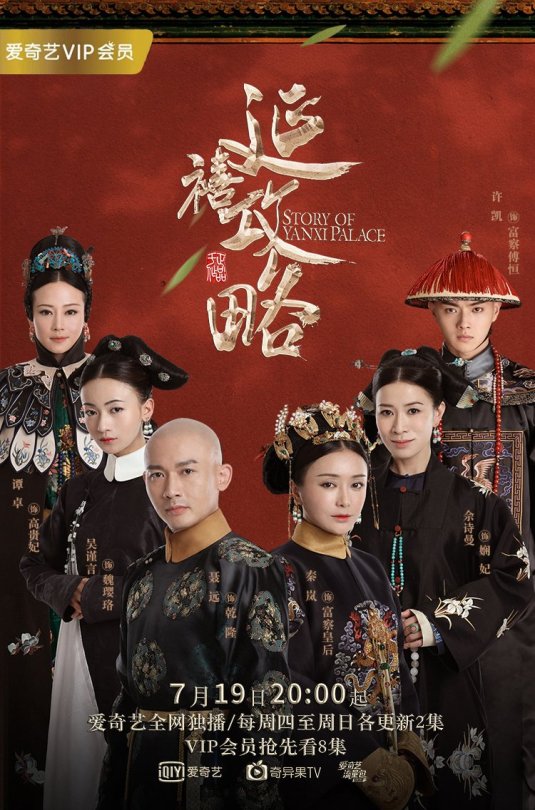
Story of Yanxi Palace is a high-budget 2018 Chinese harem drama about the historical-accuracy-adjacent antics of an extremely baller young woman who gets a job working in the Forbidden City in an attempt to discover the reasons behind her sister's death.
Imagine Nirvana in Fire, but only the scenes that take place inside the Inner Palace. So there's still schemes aplenty, but now these schemes are happening among a cast that's 90% women, all locked inside a walled city with rigid rules, excruciatingly strict hierarchies, and a very limited number of ways of getting out alive.
This show was huge in China. The English-language fandom is almost nonexistent. I'm betting most of you reading this have never even heard of it, and if you have, you have only the vaguest idea of what this 70-episode palace drama is about.
I enjoyed this show a whole hell of a lot. I also had some major issues with the show, to the point where I very nearly did not write this rec. But I'm doing it because I think the good parts of the show are worth seeing, and because I think the problem parts of the show are worth thinking about. Interested? Then follow me through these five reasons (and a few anti-reasons) I think you should watch it.
1. The Real Housewives of the Forbidden City
Tired of c-drama sausage fests? Want to see a bunch of incredibly talented ladies act their faces off? Then this is the show for you.
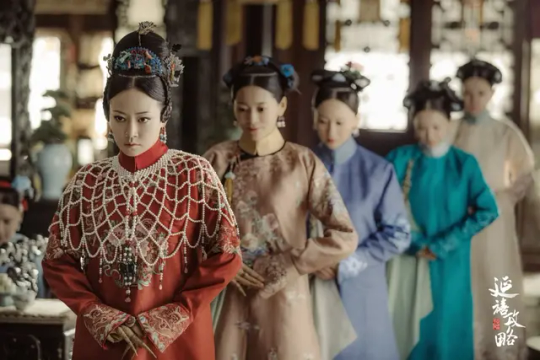
The vast majority of characters in the show are absolute bitches to one another. They are locked in a cutthroat game of power and manners where the stakes are literally life and death, so they spend their whole lives either plotting to take someone else down or counterplotting so the person trying to take them down gets taken down instead. They all know they can't trust one another, but they also sometimes can't not trust one another. They keep their friends close, and their enemies closer.
Unlike most other schemes-based shows, which are all about one big mystery, Story of Yanxi Palace has several smaller arcs. Remember the sister-murder I mentioned at the start? I was prepared for that to take the whole runtime of the show to solve; it actually gets (mostly) concluded around episode twenty-something. Antagonists arise and fall. Situations happen and resolve. Think of it less like a movie's single narrative, and more like a video game's multiple levels. Hooray, we finished Garden World! Now we get to go back to Palace World, but with way more EXP and powerups than we had before!
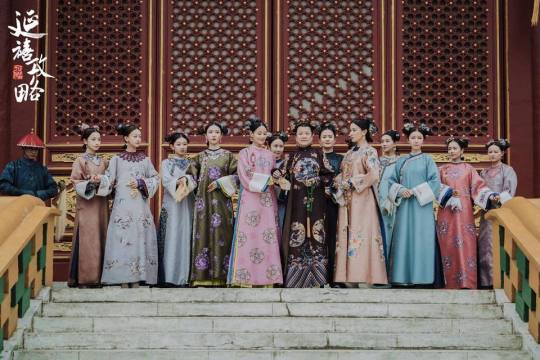
I know that looks like a bunch of lovely, high-class ladies in that shot, but it's not. It's a pit of vipers. Any woman in that lineup would straight-up shank pretty much any other woman in that lineup without hesitation or remorse. Every woman there knows exactly where she fits in the hierarchy and has a detailed plan for how to take out every woman above her to get to the top -- except for the one in black, who already did take out every woman above her to get to the top, and that's why everyone has to ostentatiously defer to her now.
If you are a fan of TV shows where folk scheme their way to success, this is really a can't-miss property for you.
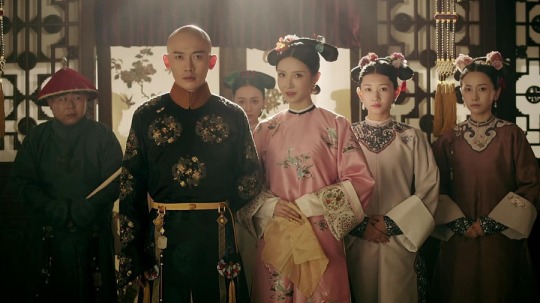
This is also a show about how smart women have to become to survive being at the mercy of stupid men. Not only are the women being vicious to one another, they're doing so while simultaneousy having to pretend that they are pretty, delicate, vapid ornaments whose only thoughts are how they want the best for their precious emperor and his beloved mommy. It's all about the exercise of soft power, how to hide your knives behind silk sleeves and a sweet smile.
So okay, it's not quite as trashy as reality TV, but it's still bitchy as hell and incredibly fun to watch.
2. You love to hate her (and her, and him, and her)
Now if you've read pretty much any one of my previous recs, you know I like a good baddie, and this is a show with some good baddies. As I said in the last point, this is a show about bad people doing bad things entertainingly.
However, I am not going to tell you who most of the show's love-to-hate characters are, because the vast majority of them do not start out hateable. If the show introduces a female character and you like her, or a eunuch character and you like him, there is like an 85% chance they're going to do a heel turn. (And then sometimes do a face turn after? Look, schemes are complicated.)
But I will tell you about one bitch who's rotten from her first moment to her last: Noble Consort Gao.

Noble Consort Gao is the scenery-chewing, shit-stirring, absolute meanest mean girl in the palace, and it is so fucking entertaining. She's your major antagonist for the first half of the show. She's strategically mean, but she's also recreationally mean. She does the anime villainess laugh for real. Her actor, Tan Zhuo, has set her bitch dial to 11 and isn't even bothering to chew the scenery -- she's shredding it with those incredible metal claw-nails she wears.
Noble Consort Gao is a good starting antagonist because she's so blatantly evil -- and yet somehow still unstoppable. She's a good example of how you can get away with being pretty much openly sinister if you also manage to mind your manners. The reason she gets away with being so damn awful to everyone else is that she's still playing by all the rules. She's managed to weaponize every convention about propriety to lord her power over everyone else. She's like a fucking HOA.
And you'll notice I'm speaking about her with such fondness because she's delightfully awful. In fact, pretty much everyone in this show is delightfully awful. There are exceptions, but on the whole, you want to see them go down, yet you're also going to be a little sad when they go. Even Noble Consort, by the end, you get where she's coming from, and you feel a little bad for her on the way out.
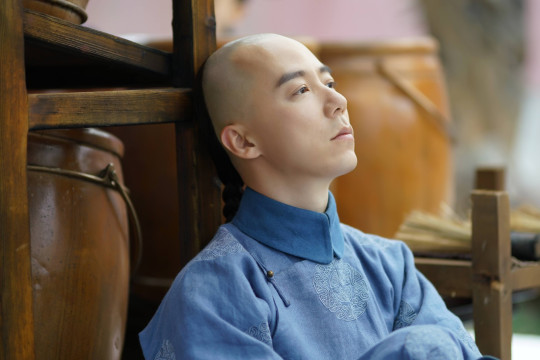
Do you like vengeance? Because we've got some vengeance for you here. Many, many people in this show have been wronged, often by the people they trusted most. And of course they all respond to this in a healthy manner, seeking justice for themselves and for their loved ones through proper channels and reasonable means.
Ha ha, just kidding, everybody here is completely unhinged! The primary difference between a good guy and a bad guy in this show is how many innocent people they wind up taking down with the guilty party. It's messy as hell and we are making popcorn about it.
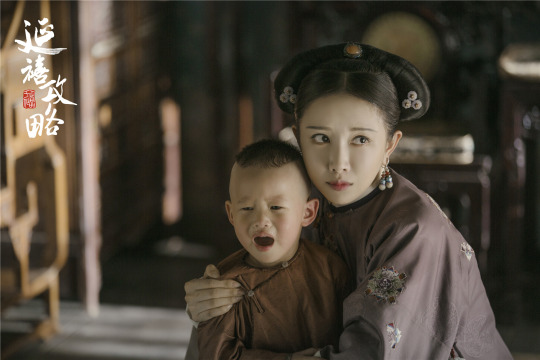
This is a show full of villains. In fact, this cast is pretty much entirely bad guys, semi-bad guys, potential bad guys, and good people who had to do bad things to survive. There are maybe two non-child characters who are Just Plain Good that don't get nuked almost immediately. Everyone else is some shade of grey. Even our hero (and we'll get to her in a minute) is pretty yikes-inducing cruel when she needs to be.
Going to say this as clearly as I can: This is not a show for people who cannot tolerate moral ambiguity. This is a show for people who love to watch clever bastards work. And pretty much nobody's more of a bastard than Noble Consort Gao.
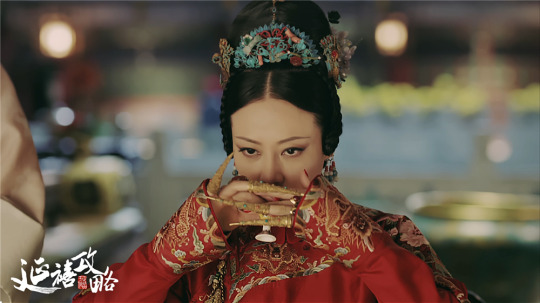
Ladies and gentlemen, the cunt is served.
3. No, seriously, this is actually what it all looked like
If you are at all interested in this actual time period, you owe it to yourself to see this dedicated work of historical recreation.

The amount of research and detail that went into this production is honestly mind-blowing. Because this show is set in the 18th century, we actually have some pretty great documentation about the places, objects, and people involved in this story -- including some (slightly later, obviously) photographs! The production went all out in its attempts to replicate the setting, including using period-appropriate techniques to create various accessories and objects.
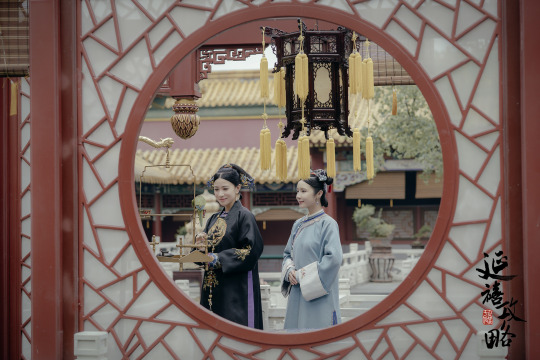
The outfits are amazing -- and excruciatingly accurate in several aspects. I've seen more than a couple people say that their first reaction to the costumes was, ho hum, kind of boring. Well, yeah, compared to some of the absolutely bugfuck-complicated wearable works of art from earlier periods, these are a little understated. But then you start paying attention to the million little details: the embroidery, the hair ornaments, the layers, the fabrics. A whole team of people clearly put a huge amount of work into these outfits.
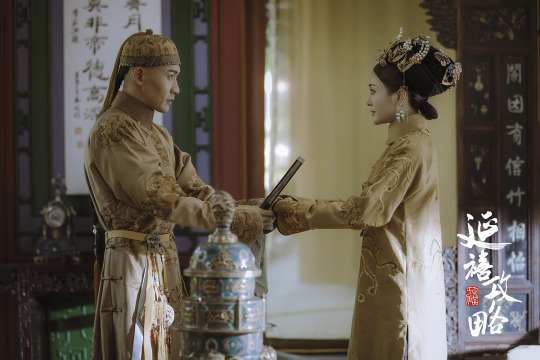
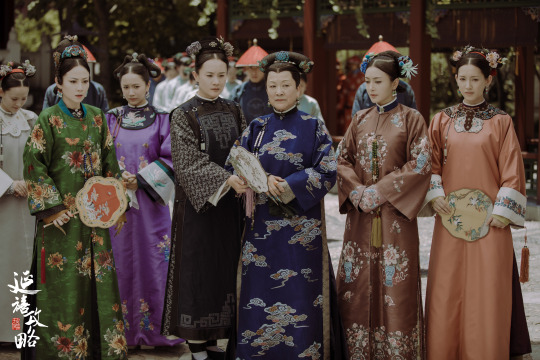
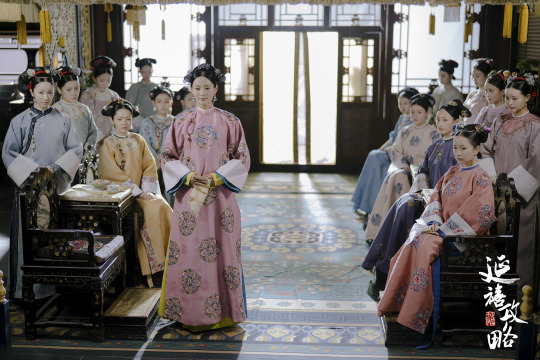
Nearly every royal character in the show is a real person. You could spoil yourself for several major plot beats just by going to Wikipedia. In fact, I accidentally did this, because I was reading the show's DramaWiki page and thought, oh, that's interesting; I understand why the actor names are links (because it takes you to the actors' pages), but why are so many of the character names also links? Turns out: Wikipedia! So, uh, careful where you click.

One of the great things about the show is how utterly claustrophobic it is. Most of it takes place within the heavily guarded walls of the Forbidden Palace; on the very few occasion it goes somewhere else, you're just traveling to other walled manors and villas. There's one brief scene in a forest, and the psychological difference is enormous. You see a few trees and you're immediately like, oh, so that's why these women are going crazy in their gilded cages.
The drama even shows how some of the least glamorous parts of the Forbidden Palace work: the chamber pots, the coal for furnaces, the mopping, the weeding, the laundry, the fire brigades. It's an enormous production, keeping what is basically a 178-acre city-state running to imperial standards. It's nice to see a drama that acknowledges that while rich people may want to see only clean walkways and fresh sheets, those things don't happen by magic.
If anything, knowing about all this detailed research makes the unintentionally funniest scene in the entire show -- the one with the eunuchs playing Western instruments -- ten times funnier. You had artisans spending months doing exact recreations of historical hairpins, and you couldn't spend thirty seconds asking the internet "when were saxophones invented?" or "does an accordion make noises like a string quartet?" Perfect. No notes.
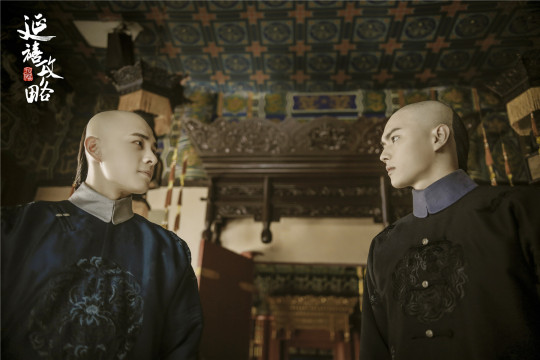
Trust me when I say you'll get used to the queue haircuts on the dudes. It helps that most of the time, they're facing the camera so they just look like they've got their heads fully shaved, and most of them have heads that look very good shaved! ...Most.
4. The kind of girl who'd make Mei Changsu say damn
The show has a strong ensemble cast, but the woman at the core of all the action is the tough-as-nails protagonist, Wei Yingluo.

The details we have on the actual Lady Wei are sparse. She doesn't really exist as a person in the historical record, to the point where we don't even know her given name (if she even had one) or when she showed up to the palace. We mostly know when she got given her titles, how many kids she gave birth to, some of what she did later in life, and when she died. The show takes these historical gaps and just runs with them, weaving into the silences a narrative that, while implausible, could have happened!
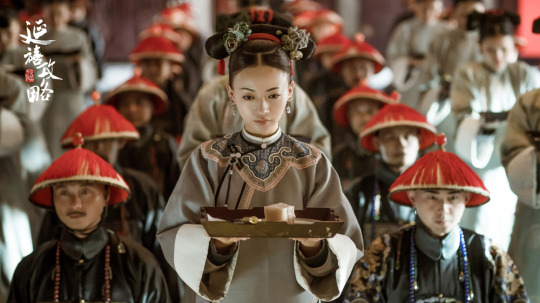
The show starts when Wei Yingluo enters the Forbidden City, not as a royal lady concubine, but as a regular little maid. She's got an agenda, though -- as mentioned earlier, her sister has died tragically, and she wants to figure out why. The stakes get higher as it becomes clear just how much people don't want this question answered, for their sakes as much as for hers.
She very quickly realizes that she can't just live a quiet life and snoop around casually. Too many people are out to get her, and if she's going to survive, she's got to fuck with them before they fuck with her. And they are wholly unprepared for the self-destructive lengths to which she will go to to fuck with them.
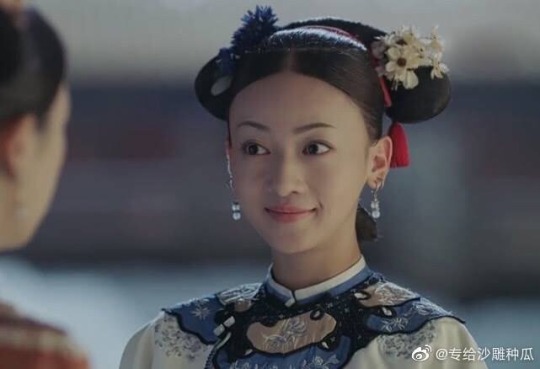
Wu Jinyan deserves all the accolades for turning in a great performance. She has to be completely all over the board emotionally and energy-wise for seventy whole episodes, and she brings it. She's very funny and physical when the show calls for her to be! She's willing to flail around and stuff her face and ugly-cry. Then she turns on the don't-mess-with-me stare and the temperature in the room drops ten degrees. Did she get some award for this? [checks her DramaWiki page] Okay, she got several awards for this, good. Even in a huge cast this talented, she's an absolute standout. I can't wait to see her in the Double, which is definitely on my to-watch list.
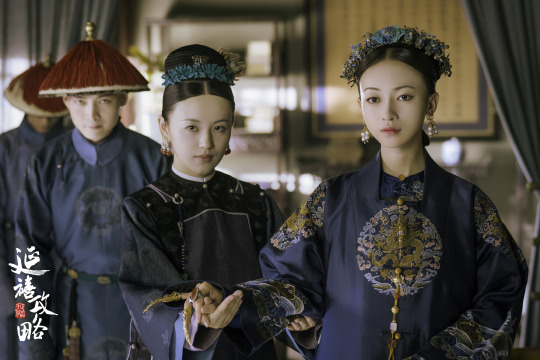
I'm not going to call Wei Yingluo a Mary Sue, because that's not accurate, but this girl does have some serious plot armor on. You never get the sense that she hasn't earned it, though. She's smart, capable, and more than a little completely fucking crazy. The show makes you believe that the reason she survives most of the shit she pulls off is that everyone is just so baffled that anyone would try it at all that they don't even know how to respond.
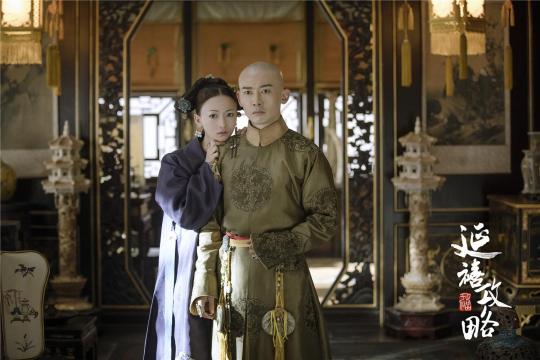
I thought about starting out this rec post with Wei Yingluo -- putting her above the cut, in fact, because she really is that compelling. She's back here, though, because it's with Wei Yingluo that we start to slide into my points of critique. Too often, female protagonists are here to solve the problem with their cuteness and quirkiness and extra-special perfectness that shows up all the other girls and captures the heart of whatever boy she needs to save the day. And no matter how this show starts off wanting to make her something different, it ultimately can't conceive of a female lead who isn't at her core just like that.
The writers can never decide how much Wei Yingluo's Manic Pixie Dream Girl act is an act, and how much she means it. The show introduces her as a stone-cold psychopath who is capable of feigning being a carefree brainless uwu smol bean. Later it decides, actually, she's really at her core a spunky, soft-hearted creature who likes to goof off and is just capable of switching on Scheming Bitch Mode when she needs it! And it's like, are you kidding? You just spent like forty episodes telling me that it's all a big trick when she does this, and now you're saying it's not anymore?
It's like they made a character capable of decieving men, and then got decieved by her, which you have to respect. Any fictional character can fool another fictional character; only true legends fool their creators.
sidebar: fuck that dude
The show can never fully commit to this bit, because he's supposed to be our big heroic love interest, but the emperor fucking sucks.
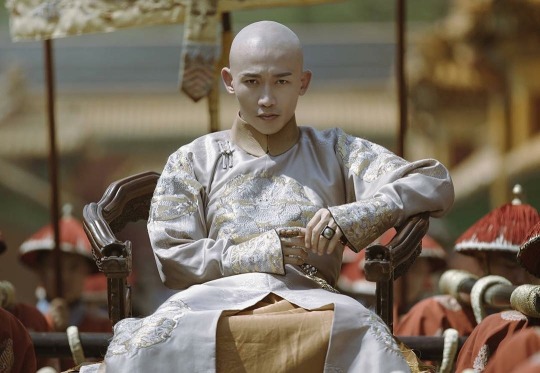
Hands-down the show's biggest moral is that All Emperors Are Bastards -- yes, even the ones in relationships we're supposed to find cute; yes, even the ones whose lifestyles we're supposed to envy; yes, even the ones played superbly by the devastatingly handsome Nie Yuan. While watching we repeatedly invoked this tweet:
Being a billionaire must be insane. You can buy new teeth, new skin. All your chairs cost 20,000 dollars and weigh 2,000 pounds. Your life is just a series of your own preferences. In terms of cognitive impairment it's probably like being kicked in the head by a horse every day
He is the dumbest, most easily played motherfucker in China. Getting horny makes him stupid, and he's horny all the time. He has absolute power over the lives of everyone in the empire, and you can distract him with the mere suggestion of a vagina. He has taken a full You Girls Fight It Out Amongst Yourselves stance toward his scheming harem. This will not go well for anyone.
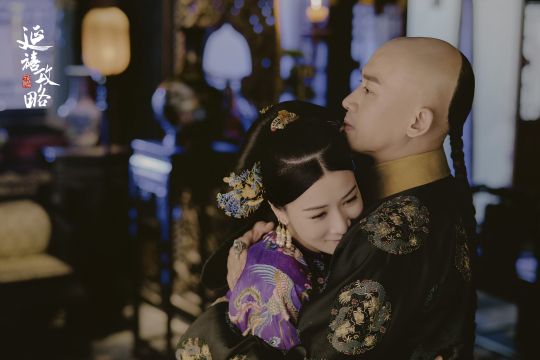
And speaking of those wives, no matter how many times they loudly profess their undying devotion to him, I have a rough time imagining these women feel anything for the Emperor beyond exhausted contempt. Well, okay, maybe the Empress who married him before he took the throne, since she had a chance to get to know him before he was in full Emperor Mode. But none of the other women should ever stop dunking on this guy like the gullible shitbag he is. If you (like me!) are already skeptical about any given heterosexual romance in fiction, be prepared to roll your eyes through the Big True Love Story this one tries to sell you.
5. Right on the cusp of a fascinating feminist conclusion!
I may be on this one for a while; skip ahead if you like.
Okay, so: What little English-language buzz I've seen about this show has used the word "feminist" about it -- mostly in conjunction with how the show's popularity made the CCP sour on its failure to portray appropriate communist values (???). So I went into it expecting feminism! And I got a show with a whole bunch of female characters in it! And hoo boy, are those two things not necessarily the same!
This show is a great example of how merely passing the Bechdel-Wallace Test doesn't make something feminist. Sure, it's mostly about a single woman who, through her plucky nature, rises in the ranks of power. But that is feminist only by the shallowest, most girlboss, Lean-In-ass definition of the word.
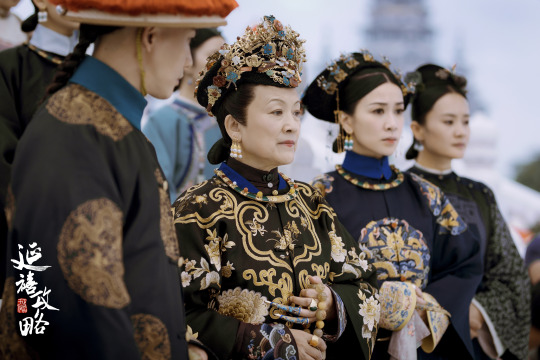
At the beginning, you can kinda tell this was written, produced, and directed by men. By the time you get to the end, you can absolutely tell that the production team was dudes from top to bottom. This, to me, is the big tell: that the show cannot conceive that anything these women are doing could be interesting unless it's trying to stab another woman in the back. There is a time jump very near the end, where the few female characters still standing agree to stop being shitty to one another -- and then fast-forward a decade, because why would we care about seeing what their lives are like when they're not being shitty to one another?
The show is incredibly constrained by Actual History. At the end of the day, it's a Cinderella story, and as such, we have to cheer for the social and legal mechanisms that make it possible -- even when they're grotesquely misogynistic. The show lets its female characters pay lip service to how awful it is that women are little more than breeding stock, but it doesn't let them do anything about it. Mothers can be obliquely sad that their daughters are being fed to the same patriarchy machine that fucked them up, but talking is the most they can accomplish ... because those daughters were real people who were actually fed into the patriarchy machine. We know this. We have documentation. China is very good at keeping receipts.
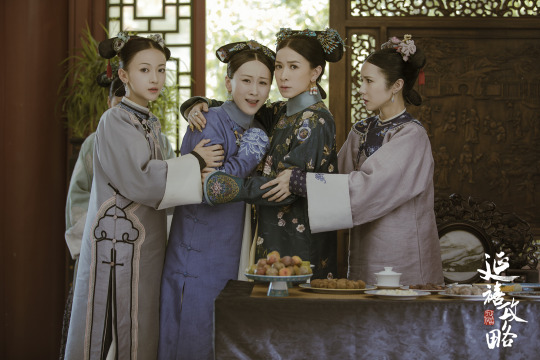
Wei Yingluo starts out as a servant, and throughout the first half of the show, she moves up and down in the servant ranks -- and all the while it makes the point that being a servant fucking sucks. Maybe it's better when you get to work directly under someone you really like, but the actual job sucks shit and puts you at the mercy of everyone above you in the palace hierarchy. Your life is not your own. You're barely a person. You can easily get executed for merely working in the same household as someone who broke the rules.
The feminist answer to this dilemma is to notice that the system is bad and either a) refuse to participate in it, or b) use your power to mitigate its badness. The show, however, clearly thinks that the real problem with this whole setup is that the people we like aren't at the top of it. Somebody has to take the abuse; you just don't want that somebody to be you. Once Wei Yingluo gets to a place of real power in the palace hierarchy, she starts behaving very much like the people who used to be shitty to her and takes no steps to prevent the early-show damage she suffered from happening to other people.
Now: You can make the argument that if she'd done all those radical things, she would've been dead meat -- and I think you'd be correct! But the show never indicates that it gives a second thought to how abusive and unfair this all is. Survival in this system means exploiting the people below you. There's not a neutral option. And this show expects you to cheer for exploiting the "right" people.
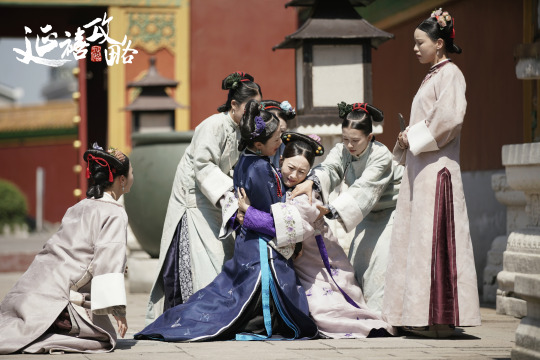
The show never quite seems to internalize what the stakes are -- at least, not for more than a moment or two at a time. I made the Real Housewives joke because the show more or less treats the consort-on-consort schemes as fun catfights by mean girls wanting to be the prom queen. It almost gets to the point of realizing that a woman's place in the harem is literal life-and-death shit for her, and that if she can't produce a son and work him into a powerful position, she's fucked. It always bunts when it gets there, though, choosing to play up vanity and petty grievances instead of the absolute desperation these women must be feeling.

It gets so close with Consort Shun to a real discussion about how awful it is that the men in their lives see them as pretty objects to be bartered for favor and power with other men. But it can't fully go there, because that would undermine the structures propping up this Cinderella story, and then we couldn't feel good about the Cinderella story. And we want to feel good about the Cinderella story. We will burn every other female character in the show if we get to feel good about the Cinderella story.
I've made a lot of jokes about lesbians in this show, but the truth is, it is chronically deficient in lesbianism. Lesbian sex would have improved the lives of at least half the characters here, if not more. Unlike a lot of other historical c-drama shows, Yanxi Palace acknowledges the reality and possibility both male and female same-sex sexual desire -- but it does so in order to say that both are bad. (I legitimately cannot tell if the production is doing this to show how regrettably anti-gay the past was or to play on the audience's expected homophobic disgust. I suspect the latter, but I genuinely don't know.) While it does the fascinating thing of showing desire and coupled relationships between women and eunuchs, it has no idea how queer those setups are, nor does it acknowledge the possibility for same-sex pairings to fill that same positive dynamic.
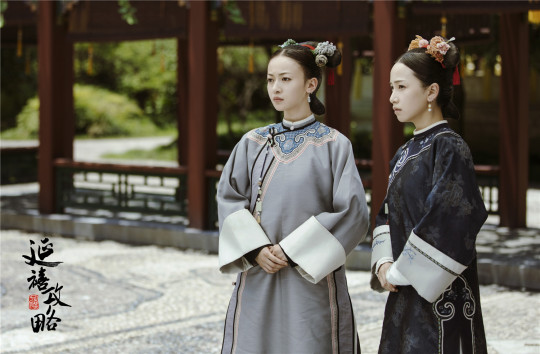
So why on earth would I list this whole mess of problematic attitudes as a reason for, and not against, watching the show?
Because it is fascinating to think about. Look, I've burned a lot of time and brainpower here writing several paragraphs that no one is ever going to read about how interesting the show's moves are. It has the weird problem where it understands what happens when you lock a bunch of women together in a high-pressure situation keyed to a brutal hierarchy -- but it doesn't ever appear to quite get why. At least, not beyond the sense that people will claw their way to the top of any hierarchy they have access to, just because it's there. (Watch how it treats the few exceptions to this, the rare nonambitious characters. See how long they stay nonambitious.)
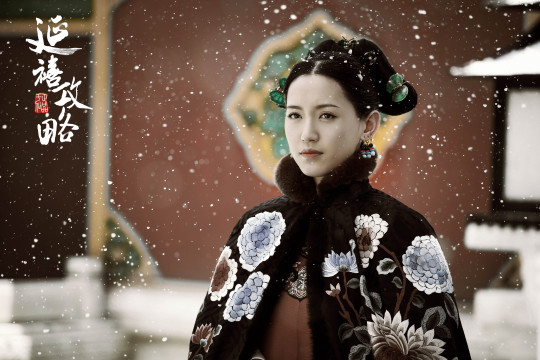
As I said when I labeled this point, the show is just on the edge of a smart conclusion, and that smart conclusion has to do with how awful it is that women are both the people who suffer most under heteropatriarchy and the people who work the hardest to uphold it.
Yes, the world into which these women have been thrust is awful. But they make it ten times more awful because they're all semi-voluntarily engaged in a vicious, Highlander-esque zero-sum competition. They could cut one another some slack, but they're more invested in continuing the cycle of abuse to maintain an intense, repressive order. The ones that try to be kind about it get repeatedly fucked by the ones who have no interest in kindness. They all have to engage in performative rituals that mimic sincerity without actually producing a single genuine emotion toward one another. It's horrifying and paranoia-inducing in the extreme. And they're doing most of it to themselves.
If it were really feminist, the moral of the Story of Yanxi Palace would be it does't have to be like this. This dynamic is not inevitable; this is a choice perpetuated by generations of people who benefit from it just enough not to question its correctness.
Sadly, there's still enough promise in patriarchy that being a Good Girl will save you from the shit we put the Bad Girls through -- so don't you want to be a Good Girl? All we need you to do is throw all those icky Bad Girls under the bus. It's their fault for being Bad Girls anyway. But you? You don't have to be afraid. We're not going to hurt you. You deserve all the good things we're giving you. You're not like all the other girls. You're different. You're special.
Just don't forget to watch your back.
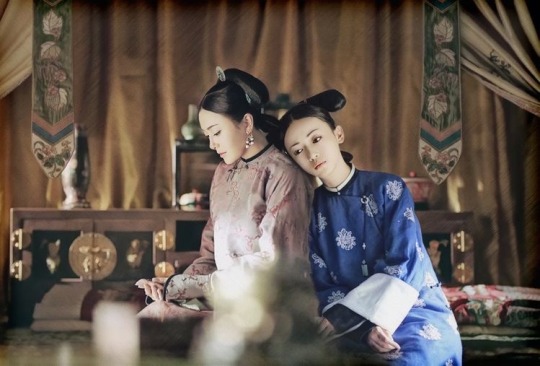
If anything, I think the CCP is terribly wrong: This show is an excellent demonstration of communist values, in that if these women had just joined together in solidarity, all their lives would have been so much better! The Emperor should have been posting helplessly on Reddit like "My (55M) consorts (40F, 36F, 31F, 28F, 22F, 19F) have unionized" so the entire internet could come for his ass.
Care to watch?
This is another of those shows you can find in a whole bunch of places! Here's the ones I know about:
YouTube
TVBAnywhere
Viki
Tubi
iQiyi
I know seventy episodes is a commitment. I know eighteenth-century palace drama is a lot. I know that last selling point of mine seemed to go on for-fucking-ever and you probably didn't read any of it. But this show is a beautiful work that I think more people should see, warts and all. Besides, if all we ever consume is ideologically "pure" media, how do we learn to think critically about anything?

True story: My Chinese colleague, knowing I was watching this show, taught me slang for "lesbian." It's 拉拉 (lala). Very useful.
47 notes
·
View notes
Text
I keep seeing anti-Maiko people complain that Mai never had a redemption arc to learn about why the Fire Nation was bad, and that's why she shouldn't be with Zuko. And I think that fundamentally misunderstands what a secondary character is. Mai is not a main character. She is a secondary character. She is there to provide support to the narrative, she is there to fulfill her plot purposes and that's it. That doesn't mean she has no character development, but her character development is mostly related to her function in the narrative. In Mai's case, her main functions in the narrative are being Zuko's love interest, and being a key piece in Azula's downfall. Her character development is related to that: we have a girl who is closed off and suppresses her emotions who gradually starts to open up a little through her relationship with Zuko. We also have her feeling like she's always trapped by fear and by others expectations (by her parents and by Azula), and because of her relationship with Zuko, she is able to finally stand up to Azula. That's her character arc. That's what's relevant to her function in the story. Learning about how the Fire Nation is bad is not relevant to her main plot purposes in the story. There's no reason why it can't happen offscreen after the war, with Zuko teaching her about all the things he saw and learned about the Fire Nation during his travels. She is not a main character, the show doesn't need to focus on every single thing about her character. In case people forget, we don't get a "redemption arc" for Ty Lee either, because this is not important, neither Mai or Ty Lee are meant to be the focus of the narrative, we don't need to see them "learning that the Fire Nation is bad".
Another thing that people don't understand is that not every character has to be a copy of Zuko. People act like the only acceptable way for Mai to learn about the wrongs of the Fire Nation is by having a redemption arc like Zuko, but that's not really the case. It's not even feasible: Mai didn't go through the same experiences as Zuko, she wasn't forced to live as a commoner amongst the Earth Kingdom peasants, she wasn't forced to flee as a refugee, so she never really had the opportunity to speak to these people and see their plight the same way Zuko had. Of course Zuko is the one who gets the redemption arc, because he is the main character for which this arc actually matters to the story, but also because the circumstances of his story allow him to have this arc, while the circumstances of Mai's story don't. But that in no way means she is irredeemable or that she can't learn, it just means she will learn about the Fire Nation in a different way than Zuko did, probably through Zuko himself telling her about his experiences and the things he saw. And there's nothing wrong with that! Mai is not a main character, she doesn't need to have some epic redemption journey. She was a Fire Nation noble, just like Zuko, she was taught the same kind of propaganda that Zuko was, so of course she's going to believe in it and believe that Zuko is betraying his country when he tells her he joined the Avatar. But Mai is also not some cruel person, and she's also not a Fire Nation fanatic. If after the show Zuko told her about all the things he saw, she would listen. And in fact, the evidence we have is that she did listen to Zuko and she did learn about the Fire Nation: in the comics she works with Zuko against the New Ozai Society even after they break up. And if you don't want to use the comics as evidence, we have the epilogue of the show as evidence, in which Mai is shown to be on good terms with Team Avatar and playing Pai Sho with Suki. We don't need to see the details of how Mai learned about the Fire Nation being bad (she is not a main character, it's not relevant to the main story), we know that she did learn, we can fill in the blanks with our imagination.
Secondary characters not receiving a huge narrative focus and character development about every single aspect of their characters is not "bad writing". Bad writing would be if the show focused on every detail of every secondary character, because that would be losing narrative focus. Just because certain people don't like Mai with Zuko and use this as an excuse to say why the ship is bad, it doesn't mean that Mai not having a redemption arc is "bad writing".
Finally, this isn't a reason for her not to be with Zuko. Some people argue that Zuko would never want to be with Mai after his redemption because of her still believing that the Fire Nation was in the right, but people forget that if there's one person who knows what is like to have been brainwashed since childhood with propaganda about the Fire Nation, that person is Zuko. And Zuko was way more enthusiastic about the Fire Nation being right and the Fire Nation winning the war than Mai ever was. Why would he hold it against her that she believed in Fire Nation propaganda, when he himself knows what is like to believe in said propaganda? The most likely thing to happen is that he would want to teach her about everything he learned about the Fire Nation, he wouldn't break up with her just because she didn't magically unlearn an entire life of indoctrination.
108 notes
·
View notes
Text
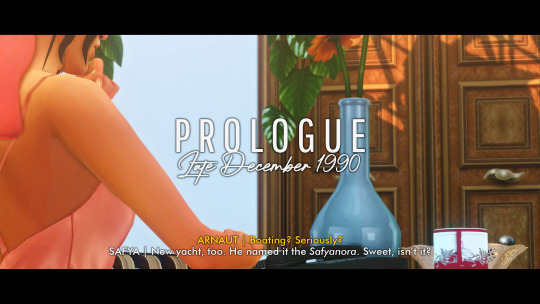
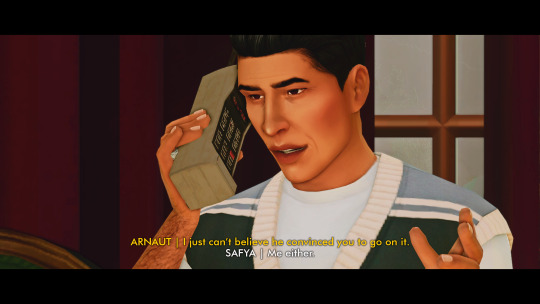


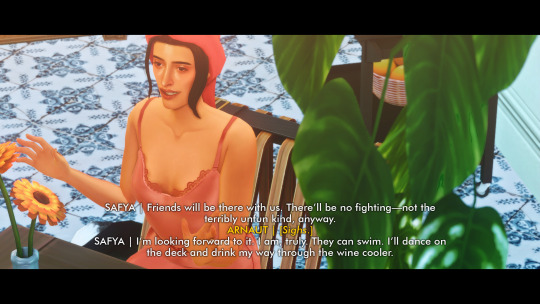


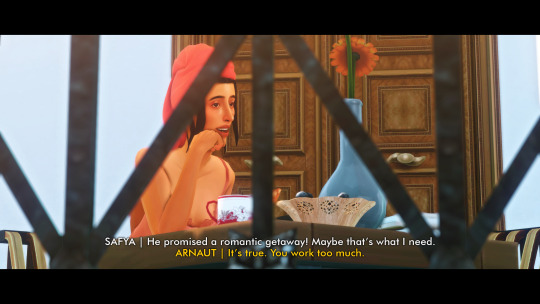


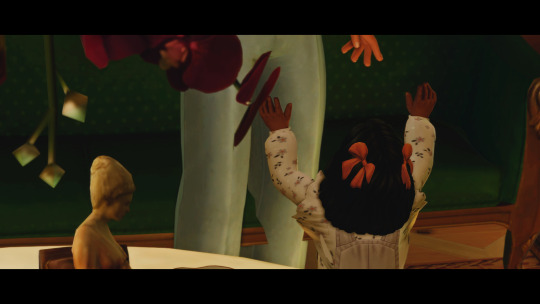
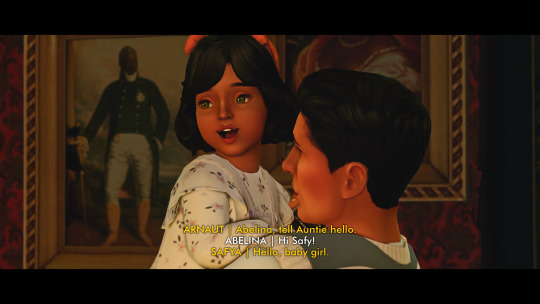
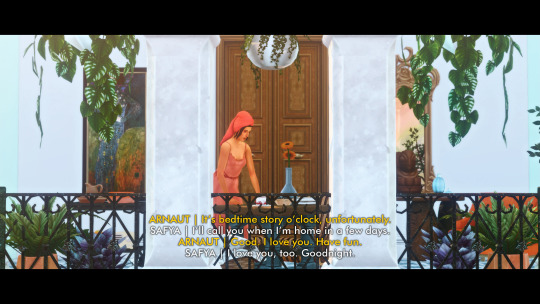


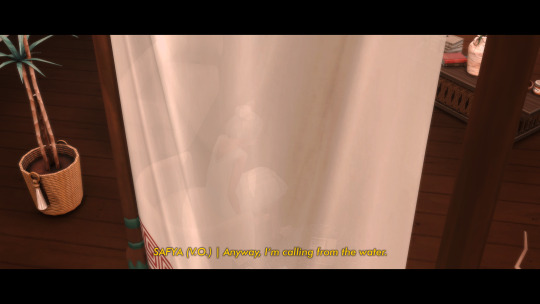

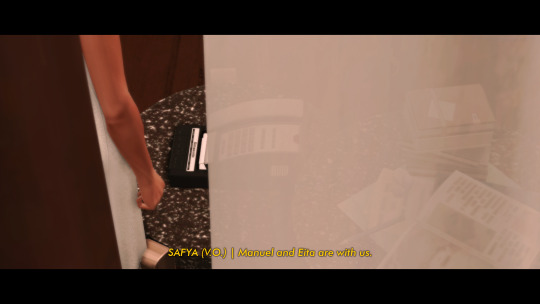
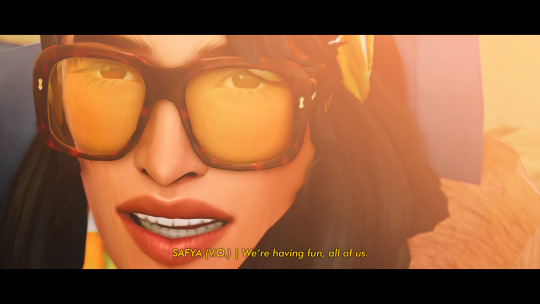
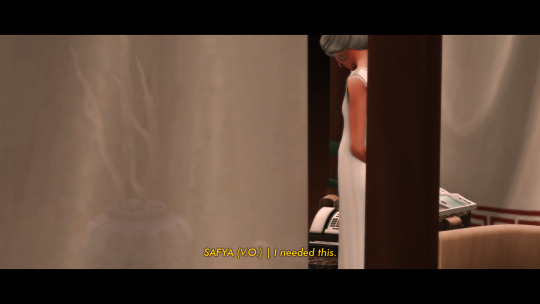
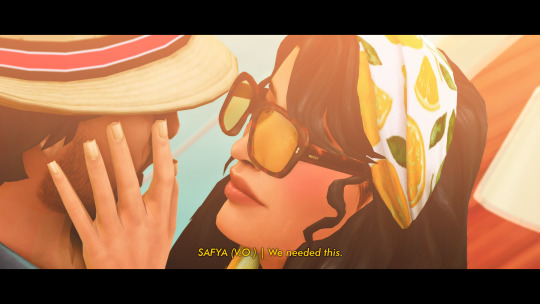




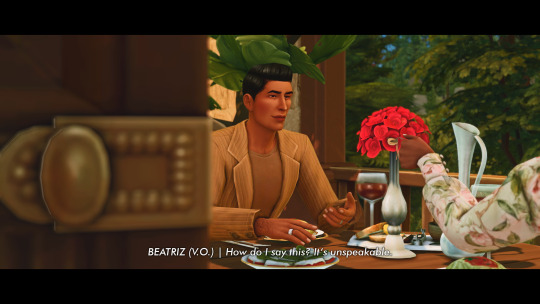

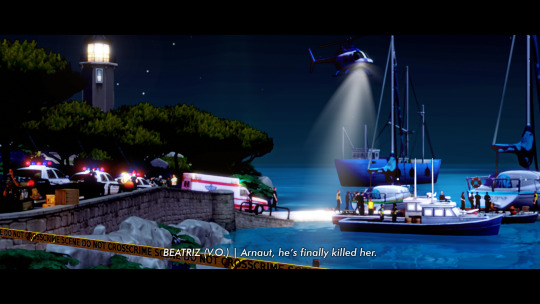
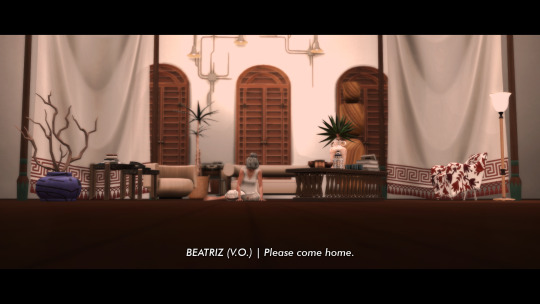
𝐍𝐎. 𝟏 𝐩𝐫𝐨𝐥𝐨𝐠𝐮𝐞 | VARIOUS LOCATIONS, DECEMBER 1990
❧ 𝐝𝐢𝐫𝐞𝐜𝐭𝐨𝐫𝐲 / 𝐧𝐞𝐱𝐭.
❛ The banality of human tragedy wasn’t enough for a princess. Some may have said it was an insult. The publishers, insatiable in their hunger for a story, chased answers. They would force slippery, delicate reality into the shackles of narrative. They would explain the unexplainable. Numerous leads bubbled forth in the immediate days following the event. At first, they came as a respectful trickle of whispers. Then, they came in a loud burst that could fill the amorphous space between breaking news and solemn coverage of a state funeral. Most of the claims were false: the queen had held the gaze of an owl twenty days prior; a storm had thrown and scattered stones in an ominous glyph; waterway residents had heard plaintive weeping from the water before the disappearance; a daykeeper sent a letter to the palace warning the mountains were shaking with longing; the princess was terrified of water and had diligently avoided it before this fateful outing. The latter was true.
𝐜𝐨𝐧𝐭𝐢𝐧𝐮𝐞𝐝 & 𝐭𝐫𝐚𝐧𝐬𝐜𝐫𝐢𝐩𝐭 ↓
It wasn’t moving water that paralyzed her. She had appreciated the crashing of beach waves and the foaming, rushing flow of rivers. The waterfalls in Yaas had captivated her. The problem was still water. Placid and smooth, the expanses of lakes and ponds and swimming pools unsettled her to the core. Others saw them as gentle and inviting; these comely traits, to her, were the duplicity inherent to any natural danger.
As with many fears, this one had been formative. These bodies summoned memories of gasping and flailing—a visceral recollection of the moment in which her swimming education both began and ended. The publishers would report that she refused to bathe in tubs or put her face beneath a shower head. These details were embellishments, but they knitted together the perfect narrative to rendered the death star-crossed, inevitable, and shadowing even in the unobstructed light of day. With such winking glints of absurdity, a deluge of articles teased intrigue from something utterly ordinary.
Indeed, that was the wretched truth with which the family had to contend, even as days of newsprint consoled the public with fantasy. Once the body was recovered a few hours later, the coroner called it what her fellow passengers had assumed: an accident. People drowned in Uspana every day. Such a demise was considered divinely favored, and the context—the story that underwrote it—didn’t matter. The mountains claimed their favorites regardless of whether their lungs filled with a few inches of bathwater or deep inhales of Canarís Bay saltwater. These favorites were regular people. They were also, from time to time, royalty.
The cause was misadventure, not malevolence.
Still, when Beatriz stumbled over to the telephone on the day she received the news, she took a deep breath to steady herself and said with conviction, “Arnaut, he's finally killed her. Please come home.”
TRANSCRIPT:
[A] Boating? Seriously? [S] New yacht, too. He named it the Safyanora. Sweet, isn't it?
[A] I just can't believe he convinced you to go on it. [S] Me either.
[S] We've been giving each other space for a few weeks. [A] Is that what you call it?
[S] I should put in effort, you know? Be forgiving. [A] You do. You are. The problem is when he takes advantage of it, which is every single time.
[S] Friends will be there with us. There'll be no fighting—not the terribly unfun kind, anyway. [A] {Sighs.}
[A] And you're still not wearing the ring?
[S] For now. We'll see how I feel after this trip. [A] Uh huh.
[S] He promised a romantic getaway! Maybe that's what I need. [A] It's true. You work too much.
[S] No, you don't work enough—[A] Hold on. Someone's here.
[S] I can let you go … I do have work to do. [A] {Chuckling.}
[A] Abelina, tell Auntie hello. [AB] Hi Safy! [S] Hello, baby girl.
[A] It's bedtime story o'clock, unfortunately. [S] I'll call you when I'm home in a few days. [A] Good. I love you. Have fun. [S] I love you, too. Goodnight.
[S] {V.O.} Hi Mama. Sorry I missed you.
[S] {V.O.} We arrived in Intizara a couple days ago. There were more cameras than usual. It was disconcerting.
[S] {V.O.} Anyway, I'm calling you from the water.
[S] {V.O.} Aren't you proud of me? {Chuckles.}
[S] {V.O.} Manuel and Eita are with us.
[S] {V.O.} We're having fun, all of us.
[S] {V.O.} I needed this.
[S] {V.O.} We needed this.
[S] {V.O.} I know you don't want to hear it, but he's making an effort.
[S] {V.O.} I feel hopeful. Call me back. I love you.
[B] {V.O.} This is not a message for voicemail.
[B] {V.O.} I wish you had come to the phone just this once.
[B] {V.O.} How do I say this? It's unspeakable.
[B] {V.O.} {Sighs.}
[B] {V.O.} Arnaut, he's finally killed her.
[B] {V.O.} Please come home.
#it's TIME !!!!!!!!!!#;long post#ts4 story#ts4 royalty#ts4 historical#sims 4 story#sims 4 royalty#sims 4 historical#ts4 royal legacy#ts4 royal family#royal sims#sims 4 history#sims 4 royal story#sims 4 royal legacy#reyes.story.post#ch.saya#ch.arnaut#ch.beatriz#ch.lorraine#1992.story.post#1992.a1#1992.ep01
143 notes
·
View notes
Text

T&N is a canon divergence fest for the All For The Game fandom, accepting fic, art (any medium!) and podfic.
Important Links: 💚 Prompt form & gallery 💚 Our Twitter 🧡 Then & NOW (2023) AO3 Collection
Our 2024 theme is Then & Never: Canon Divergence, which means all your creations must exist within the canon universe, but you can go off-course when it comes to the narrative.
The concept of Canon Divergence and Alternative Universe coexist in a lot of situations. Fanlore’s definition of Canon Divergence refers to it as “a term used in some fandoms for fanfiction set in a universe that diverges relatively narrowly from canon, with a point of departure in a character's backstory or during canon.”
Keeping the integrity of the universe is essential to keep it CD instead of a full AU, which means the majority of canon and the universe as we know it has to remain the same. Essentially: change one thing but leave the rest untouched. For example: the tag No Exy is an Alternative Universe because Exy is vital to the canon universe and for the canon narrative to develop, but Mary Hatford Lives would be Canon Divergence. Other examples could include ideas such as: Andrew and Aaron don’t renew their deal for college, Erik moves back to the US with Nicky, Neil grows up in the Nest, Kevin brings Jean along when he escapes.
Everyone Lives and Different First Meeting are common subtropes of Canon Divergence. This idea usually answers “what if” questions about the original narrative, like “what if X never died,” “what if X and Y met earlier,” “what if a villain was a good guy all along,” “what if Z happened earlier in the narrative,” etc. We’re looking for slight changes to canon rather than a complete overhaul of the universe as we know it.

The fest’s only real requirement is that your creations focus on canon divergence. It’s entirely up to you what pairing or pairings (or none at all — your creations don’t have to feature romantic/sexual pairings) you want to feature, what length/medium and what rating you want to go for. We trust you to tell whatever story you want to tell and make the right choices for it. As long as it’s canon divergence, the world is your oyster. Have fun!
TIMELINE
The prompting period will be from September 8th to September 14th.
The sign up period will be from September 15th until the 21st and you’ll be able to either claim a prompt from the list or sign-up with your own idea.
Artists, writers and podficcers will then have until the deadline on October 19th to finish and post their creations.
Posting will start on October 27th and we will stagger the posting of your creations so that everyone has time to read, enjoy, and hype up every creation.
Reveals will happen on the 15th of November.
Let’s go through what every step entails:
PROMPTING
Prompting will open on September 8th, and will end on September 14th. Anyone can prompt and you can prompt as many ideas as you’d like using our form.
Once you open the form, you’ll be asked for the following info:
- pairing (if applicable)
- your prompt (this can be as detailed or as vague as you want it to be)
- if your prompt is nsfw (so that creators browsing the prompts can filter those out if they want)
- your ao3 username (optional)
This fest isn’t an exchange so all prompts are there for inspiration in the first place. Creators do not have to include every single detail of a prompt if they pick it, but do have to use the main idea as a starting point for their works. If you leave your ao3 username when prompting, the creators can choose to gift the fic to you, though this isn’t at all a requirement.
Note that if you’re wanting to write your own idea, you don’t have to prompt it and then claim it later. There will be an option for self-prompting once sign-ups open!
SIGN-UPS/CLAIMING
The prompt list with all the available prompts will be live from the moment prompting opens. Prompts might take a few hours to pop up after being added via the prompting form but you’ll be able to check the list every day during the prompting period, so you can start gathering potential picks to claim.
Sign-ups will open on September 15th. Please note that while claiming was open until the deadline last year, you only have until the 21st to sign up this time around.
The sign-up form will ask you for your name, ao3 username and an email we can use to contact you. Email will be the main form of contact between the mods and the creators so please keep this in mind when signing up.
You’ll be asked to specify if you’re creating art or fic, and if you’re claiming a prompt or self-prompting.
You can then pick a prompt from the list to claim it if that’s what you’re doing, or leave a short description of your idea if you’re self-prompting.
For the sake of the form, podfics count as art. If you’re podficcing, please leave the link to the original fic in the prompt box.
There will also be a box for any questions/comments.
The prompts left during the prompting period will only be available for claiming once for art and once for fic.
The option to sign-up as a team (either co-writers, co-artists or a writer+artist team) will be available. Co-writers will be asked to sign-up only once, and leave the information that you’re co-writing in the questions/comments/concerns box. Writer and artist teams will be asked to each sign-up individually, but let us know that you are collaborating in the questions/comments box, too.
Creators will be limited to one prompt.
CREATING
Submissions must be completely new and finished works. Unfortunately, this means no sequels for previous fics or comics you may have, and no finishing WIPs you’ve already started posting.
Even though this is an anonymous fest, we understand the rampant issue that is reposting and art stealing, so all artists are allowed to submit watermarked/signed works. You will also be given the option to take part in the fest and post your work to the collection, but for it to be posted after reveals, so it’s never anonymous.
There is no minimum word count for fics. We trust that you know the best way to tell your story, and only ask that your works are tagged appropriately and follow the prompt (if applicable) and theme.
Having your fics beta-read isn’t a requirement, but if you’d like yours beta-read and don’t know how to reach out to a beta reader feel free to ask the modding team and we can get you in touch with someone!
Podficcers are welcome to choose any fic previously posted on Ao3 that fits the Then & Never theme to read/record, as long as the original poster allows for podfics of their work to be made.
As you know, the fest will be posting anonymously so we ask you to be creative when sharing wip snippets. We trust you to know what would easily identify your fic once it posts and what is vague enough to slip through the cracks ;)
We will NOT be accepting AI-generated art or fic.
DEADLINE; CHECK-INS, EXTENSIONS AND POSTING
We will be emailing every participant during the creation period, but your final deadline for posting is October 19th. You can submit your work as soon as you have it done, though.
You’ll get detailed instructions for posting to the collection via email, and we’ll post those on both tumblr and twitter closer to the posting date. Following these instructions is crucial so that your work ends up in the collection and remains hidden until we post it and anonymous until reveals.
We’ll be sending every participant a check-in email during the creation period, but we promise that isn’t as scary as it sounds! We won’t be asking you to show us what you’re working on, or how much you have already. We just want to make sure you’re having a good time :)
If you need to drop out, please don’t hesitate and do not feel guilty. Shit happens, we get it. We only ask that you do it as early as possible, so we can adjust the posting schedule accordingly. If you need a few days past the deadline to finish, we should be able to give some people extensions too, just keep us in the loop.
There’s a lot of behind the scenes invisible work put into this by your modding team so we’d rather be told “hey, I’m really sorry but I’m not going to meet the deadline” than being ghosted. We’re all adults here, let’s respect each other’s time and efforts.
It is our priority above all that everyone enjoys taking part, so we’re here to minimise stress and worries.
When posting, don’t forget to add AFTG Then & Never 2024 as one of your tags and post your work to the collection — this will make sure it remains anonymous and hidden until we release it out into the world. Please don’t leave any references that reveal who you are before the anon period is over. You can add all your usual social media links and other potentially-revealing info when reveals happen.
You can find the collection here, and you’ll be able to find it when posting if you type AFTG_thenandnever on the “Post to Collections / Challenges” section.
There will also be a form to fill in with your name, the title of the work you submitted and the link to the work, that you can fill once you’ve posted. The link to this will be shared with you in the posting instructions email :)
(A little note: after you hit 'post' the work will be hidden in the collection until we reveal it, so the easiest way to get to it should you want to edit or just to copy the link is to go through your stats page.)
But don’t worry, we will be reinforcing all of this as we go along!! This is just so you have all the information in one place!
Once your work is posted by us, remember to change the date to the day it’s posted so it appears on top of the list for your pairing/the fandom, instead of the date you submitted it into the collection.
The whole point of this is for it to be a fun and enjoyable experience both for the participants and the readers so we’ll be running lots of activities and hyping up every work as we go along! Please keep an eye on our twitter and tumblr and join in :)
If you have any issues at any point, we’re here to help and to answer any doubts or questions. Do keep in mind we all live in different timezones and are unfortunate victims to the capitalist grindset. If you DM/ask/email us, we promise to get back to you ASAP.
We hope you have lots and lots of fun!!
💚 Your mods,
Marion, Róisín and Rory
37 notes
·
View notes
Text
Hello fellow Lukola shippers! I am here to tell you how I arrived on this ship, and offer you my, hopefully calm thoughts on how I continue to stay on this ship, continually unbothered.
I have loved Bridgerton from the first time I watched it back in 2020. I loved Colin, and especially Pen, from the very beginning. I read all of the books after watching that season and particularly fell in love with 2 of the books. I don’t have the energy at this time to talk about the second book I loved, so let’s concentrate on the first one, shall we? It was Colin and Pen’s story, of course. So, of course, I was delighted when I found out that their season would be moved up to season 3.
Now, I admit, as much as I loved the characters, and thought the actors were well cast, I was not truly excited until right before season 3 was released. Nicola and Luke’s names did not regularly roll off of my tongue as they do now. However, I was excited for the release of the first half of season 3 and started seeing TikTok video’s of them.
What was this? A world tour? With amazing interviews? How on earth did I not know that they had to REPRESS their chemistry!?! What? Wait! These two amazing people who can’t keep their hands to themselves and can’t keep their eyes from wandering are not somehow having a torrid love affair?
Well, I was a goner from that point on. My days were no longer my own. I absolutely HAD to find and watch every single video I had missed from every stop on the world tour so far. I had to know their back story. I had to find every picture I could. You would have thought it was my job to know everything I could about them. I learned a lot. Then I had to wait with everybody else for new interviews and new pictures to come out. It was hard being caught up, but then I could find out what the fans were talking about.
I truly believe that Nic and Luke love each other. They showed that love on the WT. They were both completely unhinged at times, and I loved every second of it. I also believe (based on his detailed memory from their first meeting) that Luke was drawn to Nic from the moment they first met and I think her feelings for him grew over time as they got to know each other better.
I know Luke had something with Antonia. I have personally been calling it a situationship. Obviously I don’t know any of these individuals, but from what we have been shown (by Luke in this case), it was completely casual. We have seen how he has been with past girlfriends and we have seen how he has been with Nic. In all cases he has been protective, warm, and happy around them. I have not seen a single picture (or video)of he and Antonia where he is any of those things. In fact, the few glimpses we have gotten of them together (especially the pap walk), he looked pretty miserable, or in some cases ambivalent at best. I am pretty positive he has not seen her since the Italy trip for his friend Rory’s birthday. I also think she is a true pest who wants everyone to believe what she had with Luke was a lot more than what it was and that it is still magically going on.
I think Jake is a good friend of Nics who accidentally got papped with Nic while Nic was being her regular friendly self. I think he is exactly who he (and his other friends) tried to portray himself to be before the Jakola’s tried to convince us otherwise. I think he is a good friend to Nic and in trying to protect her (from a certain DM) he ended up giving them exactly what they wanted to try to “prove” a relationship launch. I think he might have at some point tried to use that false narrative to try to get some notice, but I think it might have backfired and maybe (hopefully) he learned his lesson and is back in Nic’s good graces (which he appears to be after the friendly dinner pics we got recently). I’m just saying I don’t think Jake is a bad guy. I just don’t think he is dating Nic.
When all is said and done, I think Nic and Luke have been together since Chaos week in August. I think they are happy. I would love an announcement at some point, but I honestly don’t see us getting one any time soon. I will settle for the crumbs they are so lovingly willing to share. For now, I am only listening to what they have to tell us and not the noise of what anyone else chooses to release to try to disturb the fandom.
Sitting in my permanent seat on the ship.

20 notes
·
View notes
Text
Humanizing Your Characters (And Why You Should)
To humanize a character is not to contort an irredeemable villain into the warped funhouse mirror reflection of a hero in the last 30 seconds to gain “narrative subversion” points. To humanize is not to give said villain a tragic backstory that validates every bad choice they make in attempt to provide nuance where it does not deserve to be.
To humanize a character, villain or otherwise, is to make them flawed. Scuff them up, give them narrative birthmarks and scars and imperfections. Whether it’s your hero, their love interest, the comic relief, the mentor, the villain, the rival, these little narrative details serve to make all your literary babies better.
Why should you humanize your characters?
To do this means to write in details beyond those that service the plot, or the themes, or the motifs, morals, foreshadowing, or story. These might be (and usually are) entirely unimportant in the grand scheme of things. So, if I wrote lengthy diatribes on pacing and why every detail must matter, and character descriptions and thematic importance, why am I now suggesting go free-for-all on the fluff?
Just like real people have quirks and tics and beliefs and pet peeves that serve our no greater purpose, so should fictional people. Your average reader doesn’t have the foggiest idea what literary devices are beyond metaphor, simile foreshadowing, and anecdote, but they can tell when the author is using motif and theme and all the syntactical marvels because it reads that much richer, even if they can’t pinpoint why.
And, for shipping fodder, these tiny little details are what help your audience fall in love with the character. It doesn’t even have to be in a book – Taylor Swift (whether you like her or not) never fills her music with sexual innuendo or going clubbing. She tells stories filled with human details like dancing in the refrigerator light. People can simultaneously relate to these very specific and vivid experiences, and say “not that exactly, but man this reminds me of…” and that’s (part of) the reason her music is so popular.
What kinds of narratives need these details?
All of them. Visual media, audio, written, stage play. Now, to what degree and excess you apply these details depends on your tone, intended audience, and writing style. If your style of writing is introspection heavy, noir character drama, you might go pretty heavy on the character design.
But even if you’re writing a kids book with a scant few paragraphs of setting descriptors and internal narration, or you’re drawing a comic book – if you have characters you want people to care about, do this.
Animators, particularly, are very adept at humanizing non-human characters, because, unlike live acting, every single stroke of the pen is there with intent. They use their own reflections for facial references, record their own movements to draw a dance, and insert little bits of themselves into signature character poses so you know that *that* animator did this one.
How to humanize your characters.
I’m going to break this down into a couple sections: Costume/wardrobe, personality, beliefs/behavior/superstitions, haptics/proxemics/kinesics, and voice. They will all overlap and the sheer variety and possibilities are way too broad for me to capture every facet.
Costumes and Wardrobe
In the film Fellowship of the Ring, there’s a blink-and-you’ll-miss-it moment where, after Boromir is slain by the Uruk-Hai, Aragorn takes Boromir’s Gondorian vambraces to wear in his honor, and in honor of their shared country. He wears them the rest of the trilogy. The editing pays no extra attention to them beyond a split second of Aragorn tightening the straps, it never lingers on them, never reminds you that they’re there, but they kept it in nonetheless. His actor also included a hunting bow that didn't exist in the book because he's a roamer, a ranger, and needs to be able to feed himself, along with a couple other survival tools.
Aragorn wears plenty of other symbolic bits of costume – the light of the Evenstar we see constantly from Arwen, the Lothlorien green cloaks shared by the entire Fellowship, his re-forged sword and eventual full Gondorian regalia, but all those are Epic Movie Moments that serve a thematic purpose.
Taking the vambraces is just a small, otherwise insignificant character moment, a choice made for no other reason than that’s what this character would do. That’s what makes him human, not an archetype.
When you’re writing these details and can’t rely on sneaking them into films, you have to work a little harder to remind your audience that they exist, but not too often. A detail shifts from “human” to “plot point” when it starts to serve a purpose to the themes and story.
Inconsequentiality might be how a character ties, or doesn’t tie their shoelaces, because they just can’t be bothered so they remain permanent knots and tripping hazards. It might be a throw-away line about how they refuse to wear shorts and strictly stick to long pants because they don’t like showing off their legs. It might be perpetually greasy hair from constantly running their fingers through it with stress, or self-soothing. A necklace they fidget with, or a ring, a belt they never bother to replace even though they should, a pair of lucky socks.
Resist the urge to make it more meaningful than “this is just how they are”. If I’m using the untied shoelaces example – in Spiderverse, this became a part of the story’s themes, motifs, and foreshadowing, and doesn’t count. Which isn’t bad! It’s just not what I’m talking about.
Personality
In How to Train Your Dragon, Toothless does not speak. All his personality comes from how he moves, the noises he makes, and the expressions on his face. There’s moments, like in the finale, when his prosthetic has burned off and Hiccup tells him to hold on for a little bit longer, and you can clearly see on his face that he’s deeply uncertain about his ability to do so. It’s almost off the screen, another blink-and-you’ll-miss-it moment. Or the beat of hesitation before he lets Hiccup touch him in the Forbidden Friendship scene. Or the irritated noise he makes when he’s impatiently waiting for Hiccup to stop chatting with his dad because they have a giant dragon to murder. Or when he slaps Hiccup with his ear fin for flying them into a rock spire.
None of those details *needed* to exist to endear you to his character or to serve the scenes they’re in. The scenes would carry on just fine without them. He’s a fictional dragon, yes, but these details make him real.
Other personality tics you could include might be a character who gets frustrated with tedious things very quickly and starts making little inteligible curses under their breath. Or how they giggle when they’re excited and start bouncing on their toes. Maybe they have a tic where they snap their fingers when they’re concentrating, trying to will an idea into existence. Or they stick their tongue out while they work and get embarrassed when another character calls them on it. They roll around in their sleep, steal blankets, drool, leave dishes in the sink or are neurotic with how things must be organized. They have one CD in their car, and actually use that CD player instead of the phone jack or Bluetooth. They sing in the shower, while they cook, or while they do homework, no matter how grating their voice.
They like the smell of new shoes or Sharpies. They hate the texture of suede or velvet or sticky residues. They never pick their socks up. They hate the overhead light in their room and use 50 lamps instead. They hate turning into oncoming traffic or don’t trust their backup camera. They collect Funko Pops and insist there’s always room for more.
And about a million others.
Beliefs, Behaviors, and Superstitions
*If you happen to be writing a story where superstitions have merit, maybe skip this one.* Usually, inevitably, these evolve into character centerpieces and I can’t actually think of one off the top of my head that doesn’t become this beyond the ones we all know. A few comedic examples do come to mind:
The Magic Conch in “Club Spongebob” and the sea-bear-proof dirt circle in “The Camping Episode”
Dean Winchester’s fear and panic-driven actions in “Yellow Fever” and “Sam, Interrupted”
The references to the trolls that steal left-foot socks in How to Train Your Dragon
I’m not a fan of wasting time writing a religious character doing their religious thing when Plot Is Happening, but smaller things are what I’m talking about. Like them wearing a cross/rosary and touching it when they’re nervous. Having a specific off-beat prayer, saying, or expression because they don’t believe in cursing.
The classic ones like black cats, ladders, broken mirrors, salt, sidewalk cracks can all be funny. Athletes have plenty, too, and some of them, particularly in baseball culture, are a bit ridiculous. Not washing socks or uniforms, having a team idol they donate Double Bubble to and also rub their toes. A specific workout routine, diet, team morale dance.
Other things, too. A character who’s afraid to go back downstairs once the lights are off, or fear the basement or the backyard shed. Or they’re really put-off by this old family photo for no reason other than how glassy their eyes look and it’s creepy. They like crystals, dreamcatchers, star signs, tarot, or they absolutely do not under any circumstances.
They believe in all the tried and true ways of predicting the weather like a grizzled old sailor. They believe in ghosts, vampires, werewolves, witches, skinwalkers, doppelgangers, fairies. They talk to the cat statue in their kitchen and named it Fudge Pop. They whisper to the spirit that possessed the fridge so it stops making all that racket, and half the time, it works every time. They wear yellow for good luck or carry a rabbit’s foot. They’re not religious at all but still throw prayers out to whoever’s listening because, you know, just in case. They sit by their window sill and talk to the moon and the stars and pretend like they’re in a music video when they’re driving through the city in the rain.
Haptics, Proxemics, and Kinesics
These are, for all you non-communication and psych majors out there, touch and physical contact, how they move, and how they move around other people.
Behold, your shipping fodder.
Two shining examples of proxemics in action are the famous “close talker” episode of Seinfeld (of which every communication major has been subjected to) and Castiel’s not understanding of personal space (and human chronemic habits) in Supernatural.
These are how a character walks, if they’re flat-footed, clumsy, or tip-toers. If they make a racket or constantly spook the other characters. If they fidget or can’t sit still in a seat for five seconds, if they like to sit backwards or upside down. How they touch themselves, if they do a lot of self-soothing maneuvers (hugging themselves, rubbing their arms, touching their face, drawing their knees up, holding their neck, etc) or if they don’t do any self-soothing at all.
This is how they shake hands, if they dance while they cook or work. It’s how much space they let themselves take up, if they man-spread or keep their limbs in closer. How close they stand to others or how far. If they let themselves be touched at all, or if they always have their skin covered. If they always have their back to a wall, or are always making sure they know where the nearest exit is. If they make grand gestures when they talk and give directions. If they flinch from pats on the back or raised hands. If they lean away from loud voices or project their own. If they use their height to their advantage when arguing, puff their chest, square their shoulders, put their hands on their hips, or point fingers in accusation.
If they touch other characters as they pass by. If they’re huggers or victims of falling asleep on or near their comrades. If they must sleep facing the door, or with something solid behind them. If they can sleep in the middle of a party wholly uncaring. If they sleepwalk, sleeptalk, migrate across the bed to cuddle whoever’s nearest with no idea they’re doing it.
If they like to be held or like to hold others. If they hate being picked up and slung around or are touch-starved for it. If they like their space and stick to it or are more than happy to share.
Do they walk with grace, head held high and back straight? Or are they hunched over, head hung, watching their feet? Are they meanderers or speed-walkers? Do they cross their arms in front or lace their hands behind them? Do they bow to authority or meet that gaze head on?
I have heard that Prince Zuko, in Last Airbender, is usually drawn sleeping with his bad ear down when he doesn’t feel safe, like on his warship or anywhere in the Fire Nation, or on the road. He’s drawn on his other side once he joins the Gaang. In Dead Man’s Chest, just before Davy Jones drives the Flying Dutchman under the waves, two tentacles curl up and around the brim of his hat to keep it from blowing off in the water.
When they fight, do they attack first, or defend first? Do they touch other characters’ hair? Share makeup, share clothes? Touch their faces with boops or bonks or nuzzles and eskimo kisses? Do they crack their knuckles and necks and knees?
Do they stare in baffled curiosity at all the other characters wholly comfortable in each other's spaces because they can’t, won’t, or don’t see the point in all this nonsense? Do they say they��re happy on the outside, but are betrayed by their body language?
Voice
Whether or not to write an accent is entirely up to you. Books like Their Eyes Were Watching God writes dialogue in a vernacular specific to its characters. Westerners and southerners tend to be written with the southern drawl or dialect, ripe with stereotypical contractions. Be advised, however, that in attempt to write an accent to give your character depth, you could be instead turning off your audience who doesn’t have energy to decipher what they’re saying, or you went and wrote a racist stereotype.
Voice isn’t just accent and dialect, nor is it how it sounds, which falls more solidly under useful character descriptions. Voice for the sake of humanizing your characters concerns how they talk, how they convey their thoughts, and how they become distinct from other characters in dialogue and narration.
If you’re writing a narrative that hops heads and don’t want to include a big banner to indicate who’s talking at any given time, this is where voice matters. It is, I think, the least appreciated of all the possible traits to pay attention to.
First person narrators have the most flexibility here because the audience is zero degrees removed from their first-hand experiences. Their personality comes through sharply in how they describe things and what they pay attention to.
But it’s also in what similes and metaphors they use. I read a book that had an average (allegedly straight) male narrator going off and describing colors with types of flowers, some I had to look up because I just don’t know those off the top of my head. My immediate thought was either this character is a poorly written gay, or he’s a florist. Neither (allegedly), the writer was just being too specific.
Do they have crutch words they use? like, um, actually, so…, uh
Or repeat exclamations specific to them? yikes, yowzers, jeepers, jinkies, zoinks, balls, beans, d’oh!
Or idioms they’re fond of? Like a bat out of hell. Snowball’s chance.
Do they stutter when they’re nervous? Do they lose their train of thought and bounce around, losing other characters in the process? Do they have a non-Christian god they pray to and say something other than “thank God”? Are they from another country, culture, time period, realm, or planet with their own gods, beliefs, and idioms?
When they describe settings, how flowery is the language? Would this grizzled war hero use flowery language? How would he or she describe the color pink, versus a PTA mom? Do they use only a generic “blue, green, red” or do they really pay attention with “aquamarine, teal, emerald, viridian, vermillion, rose, ruby”?
How do this character’s hobbies affect how well they can describe dance moves, painting styles, car models, music genres?
This mostly matters when you’re head-hopping and the voice of the narrator serves to be more distinct, otherwise, what’s the point of head-hopping? Just use third-person omniscient.
If you really want to go wild, give a specific narrator unique syntax. Maybe one character is the ghost of Oscar Wild with never-ending run-on sentences. Just be sure to not go too overboard and compromise the integrity of your story.
In the book A Lesson Before Dying, a somewhat illiterate, underprivileged and undereducated minor has been given a mentor, a teacher, before they face the death penalty. At the end of the book, you read all of the letters they wrote to their teacher. There’s misspellings everywhere, almost no punctuation, and long, rambling sentences.
It’s heartbreaking. The subject matter is heavy and horrible, yes, but it’s the choice to write with such poor English that has a much bigger impact than perfect MLA format.
How to implement these details
Most of these, in the written medium, need only show up once or twice before your audience notices and wonders why they’re there. Most fall squarely under character design, which falls under exposition, and should follow all the exposition guidelines.
These details exist to be random and fluffy, but they can’t exist randomly within the narrative. If you want to have your character be superstitious, pick a relevant time to include that superstition.
Others, like ongoing speech habits or movements, still don’t overuse, especially if they’re unique. A character might like to sit backwards in a chair, but if you mention that they’re doing it every single time they sit down, your audience will wonder what’s so important and if the character is unwell.
And, of course, you can let these traits become thematically important, like a superstition being central to their personality or backstory or motivation. These all serve the same purpose of making your character feel like a real person instead of just a “character”.
Just think about tossing in a few random details every now and then and see what happens. One tiny sentence can take a background character and make them candidates for the eventual fandom’s fan favorite. Details like these turn your work from “This a story, and these are the characters who tell it” into “these are my characters, and this is their story.”
#writing advice#character design#writing tips#writing resources#exposition#writing tools#writing a book
212 notes
·
View notes